Shows

Africa Science FocusClimate-smart actions to reduce crop loss in AfricaAcross Sub-Saharan Africa, farmers are increasingly losing crops to shifting weather patterns, emerging pests and prolonged dry spells. Rising temperatures and unpredictable rainfall are changing the conditions under which food is grown, while gaps in monitoring systems make it harder to track and respond to these threats.In this episode of Africa Science Focus, we examine how climate change is accelerating crop loss and what stronger data and climate-informed interventions can offer.Our reporter, Michael Kaloki, begins in Kenya, where cereals and other staple crops remain vital to national food security. Farmers describe h...
2025-12-1648 min
Africa Science FocusHow can better data curb Africa’s crop loss crisis?Across Sub-Saharan Africa, farmers are losing large portions of their harvest before crops ever reach the market. Pests, droughts and shifting weather patterns are decimating yields, while weak data systems make the crisis even harder to fight.In this episode of Africa Science Focus, we look at how better data and stronger plant health systems can help countries respond more effectively.Our reporter, Michael Kaloki begins in Kenya, where cereals remain central to national food security. Anthony Kioko, chief executive officer of the Cereal Growers Association, explains that farmers routinely lose up to 40 per cent...
2025-12-0533 min
Africa Science FocusWhy plant health matters for One Health systemsPlant health is quietly shaping what we eat, the diseases we face and how our ecosystems function. But if you look at most One Health discussions, plants barely feature.In this episode of Africa Science Focus, we unpack why that gap exists, why it matters, and what happens when plant health and One Health finally come together.Reporter Justice Baidoo speaks with Solveig Danielsen, a plant health systems expert at the agricultural research organisation CABI (the parent organisation of SciDev.Net) and lead author of a study that offers a path forward on this issue.
2025-12-0332 min
Africa Science FocusAdvancing gender equality in research[SciDev.Net] – Following up on our previous episode that explored the funding disparities faced by women in STEM across Africa, this episode of Africa Science Focus explores the ongoing efforts to foster gender inclusion within science granting councils.In this episode, our reporters Ogechi Ekeanyanwu and Titilope Fadare speak with councils across Africa to understand the steps being taken to build a more inclusive research ecosystem.Thomas Kaluvi, an officer at the National Commission for Science and Technology in Malawi, tells us about an internal review that revealed gender imbalances in team composition in previous re...
2025-07-3030 min
Africa Science FocusForest loss adds to Africa's food crisis[SciDev.Net] Millions of people parts of Africa are facing record levels of hunger, the UN World Food Programme has warned. Yet at the same time, the region is rapidly losing forests, one of its most valuable food sources.According to the Food and Agriculture Organization, the rate of forest loss in Africa has been increasing steadily over the last three decades, with 3.94 million hectares lost between 2010 and 2020. These forests are not just biodiversity hotspots, they are vital to the survival of millions of people who rely on them for wild foods, medicine, fu...
2025-05-2930 min
Africa Science FocusSpace innovation in Africa tackling local problemsAfrica's space sector, while valued at US$22.64 billion in 2024, is still in its early stages—but scientists say it holds significant promise for addressing some of the continent’s development issues.In this episode of Africa Science Focus, reporter Michael Kaloki explores how space research and innovation are being used across the continent.Mary Makuate, a researcher at Cameroon’s Ministry of Scientific Research and Innovation, shares insights from her experience using satellite data to develop digital maps for the humanitarian response to the 2023 earthquake in Morocco.Susan Murabana, CEO of The Travelling Telesc...
2025-04-2930 min
Africa Science FocusHow language barriers are impeding science learningLanguage plays a crucial role in education, shaping how students learn and connect with the world.Yet, according to UNESCO, 40 per cent of the global population does not have access to education in a language they speak or understand.This gap presents a significant barrier to effective learning, particularly in science education, where technical terms and complex concepts are often difficult to understand in unfamiliar languages.In our first podcast episode of 2025, our reporter, Michael Kaloki, explores the importance of teaching science in local languages in Africa where multiple indigenous languages are spoken.
2025-01-2430 min
Africa Science FocusScientists harness gene editing for climate-resilient wheatBy 2030, Africa will account for 53 per cent of the world's population living in hunger, primarily due to climate change and worsening food shortages, the UN warns.In this episode of Africa Science Focus, reporter Michael Kaloki investigates how scientists are tackling the region’s food crisis by exploring gene editing to develop climate-resilient crops, particularly wheat. Cristobal Uauy, a project leader in crop genetics at the John Innes Centre in the UK, tells us how gene editing can be used to strengthen wheat's resistance to diseases and increase its nutritional value.Godwin Mac...
2024-11-1635 min
Africa Science FocusWhy researchers should drop the jargon and speak outBy communicating their research, scientists can influence policy and drive meaningful change in society. Findings from scientific research have the power to address pressing challenges in society, from climate change to disease outbreaks.But what happens when important discoveries from these studies are left to gather dust in libraries or academic journals?In this episode of Africa Science Focus, reporter Michael Kaloki speaks with African scientists and researchers about the need for better communication of scientific research. Jackie Opara-Fatoye, a science journalist and deputy coordinator at SciDevNet, Sub-Saharan Africa, h...
2024-10-3030 min
Africa Science FocusInclusive policies key to expanding women’s tech accessSystemic barriers and poor support structures are stifling the progress of women in STEMUnderrepresentation of women in science and technology is limiting the continent's access to different perspectives and innovation, educators in the sector tell Africa Science Focus.Women account for only 20 per cent of women in science and engineering in Africa and 32 per cent of research and development scientists, according to research by the UN Economic Commission for Africa.In this episode of Africa Science Focus, reporter Michael Kaloki talks to women in science, technology, engineering and maths (STEM...
2024-10-0229 min
Africa Science FocusReviving Africa's indigenous science knowledgeAfrica's indigenous knowledge holds untapped potential for scientific innovation.In a continent with so many different cultures and traditions, indigenous knowledge has enormous potential to inform and strengthen scientific research. However, the legacy of colonialism has pushed African indigenous science knowledge to the fringes.In this episode of African Science Focus, reporter Michael Kaloki speaks with African scientists and researchers about the importance of incorporating local knowledge in science communication.Ayodele Ibiyemi, a US-based Nigerian culture researcher, notes that while colonial systems affected Africa’s culture and displaced its science knowledge, th...
2024-08-0929 min
Africa Science FocusNigerian farmers, scientists divided over GM maizeThe Nigerian government's approval earlier this year of transgenic insect-resistant and drought-tolerant maize varieties, also known as TELA maize, has sparked intense debate among farmers, scientists, and the general public.In this episode of Africa Science Focus, reporter Jayne Augoye hears out the diverse perspectives on the introduction of TELA maize, a genetically modified (GM) crop, which proponents say will contribute to food and nutrition security.Samuel Agele, professor and researcher in plant ecophysiology at the Federal University of Technology, Akure, emphasised the need for public education and the regulation of genetically modified crops in...
2024-07-1830 min
Africa Science FocusCitizen science paves the way to policyCitizen science educates the public about science and enhances research for evidence-driven policiesIn this episode of Africa Science Focus, our reporter Michael Kaloki speaks with African scientists who discuss the important role citizen science plays in scientific research. Peter Elias, a geography professor in Nigeria, says communities use storytelling and folklore to document their experiences, providing valuable supplementary knowledge to scientific research.Jaqueline Goldin, a professor of anthropology in South Africa, says a major challenge she faced in her citizen science project was gaining the trust of farmers, but she s...
2024-07-1430 min
Africa Science FocusAnti-HIV vagina ring limited by cost, accessThe dapivirine vaginal ring holds promise in the fight against HIV. But for the young women in Africa who need it most, access remains a major challenge. Women aged 15 to 24 are disproportionately vulnerable to HIV infection due to a complex web of factors, including social, cultural, and economic forces. The silicone ring reduces their risk of infection by continually releasing the antiretroviral dapivirine into the vagina. In this episode of Africa Science Focus, reporter Bunmi Yekini looks at issues such as access to the ring and the impact the ring has in countries that...
2024-06-2830 min
Africa Science FocusScience informed policy could unlock progress in AfricaEffective policymaking in Africa requires collaboration between scientists and policymakers. But, despite the potential for science to drive sustainable development, the relationship between these two groups can be underwhelming. In this episode of Africa Science Focus, scientists highlight the need for scientists and policymakers to work together to create evidence-based policies to solve problems and share successful examples of scientific advisory.------------------------------------------------------------------------------------------------------------This podcast was supported by the Science Granting Councils Initiative which aims to strengthen the institutional capacities of 18 public science funding agencies in Sub-Saharan Africa. Africa Science Focus is produced by...
2024-06-2130 min
Africa Science FocusCan mini grids solve Nigeria’s electricity problems?In this episode of Africa Science Focus, our reporters Ogechi Ekeanyanwu and Titilope Fadare speak to researchers who highlight Nigeria's energy access challenges and the potential of mini grids to address them.Temilade Sesan, energy researcher and consultant, and Ewah Ileri, executive director of the International Centre for Energy, Environment and Development, a Nigerian think tank, explain what mini grids are and discuss ways to overcome regulatory hurdles to deliver sustainable energy solutions. Africa Science Focus is produced by SciDev.Net and distributed in association with your local radio station. This piece was pr...
2024-06-1030 min
Africa Science FocusDrones deliver vaccines to the ‘last mile’Poor road networks in Africa make it difficult to transport medical supplies and samples to remote communities, hindering access to healthcare. In this episode of Africa Science Focus, reporter Halima Athumani explores how drone technology can bridge this gap and serve the so-called “last mile”. She speaks with leaders of two drone companies, Kenya Flying Labs and VillageReach, about their efforts to enhance Africa's health infrastructure through drone technology. Henry Chimtengo, senior medical assistant at Malombe Health Centre in Malawi’s Mangochi district, explains how drones assisted the country’s polio vaccination drive. Do you...
2024-05-3030 min
Africa Science FocusMalawi and Mozambique combat wild poliovirusAfter Africa achieved wild poliovirus-free status in 2020, the region faced a setback with outbreaks recurring in Mozambique and Malawi in 2022. However, a swift global response by countries and health organisations, including large-scale vaccination campaigns reaching 50 million children across five nations, culminated in a recommendation this month by the independent Poliovirus Outbreak Response Assessment (OBRA) to declare the end of the wild poliovirus type 1 outbreaks in Southern Africa.In this episode of Africa Science Focus, reporter Justice Baidoo speaks to public health experts to uncover the strategies Southern African countries adopted to fight the disease.
2024-05-2130 min
Africa Science FocusGhana reduces malaria deaths by 90 per centGhana's fight against malaria has seen a major breakthrough with a 90 per cent reduction in malaria mortality since 2012.In this episode of Africa Science Focus, reporter Justice Baidoo speaks to health authorities in Ghana, who attribute this progress to a national strategy and the launch of the R21/Matrix-M vaccine. Mother-of-three Martha Obeng says her six-month-old son is “strong and very healthy” after receiving the vaccination.---------------------------------------------------------------------------------------------------------Do you have any comments, questions or feedback about our podcast episodes? Let us know at podcast@scidev.net Africa Science Focus is pro...
2024-05-1030 min
Africa Science FocusWhy ethics matters in scienceIn this episode of Africa Science Focus, our reporter Michael Kaloki speaks with African researchers on the importance of ethics in science. Jerome Singh, an adjunct professor at the Dalla Lana School of Public Health, University of Toronto, Canada, talks about the need to prioritise human wellbeing during science experiments, while Emma Ruttkamp-Bloem, chair of UNESCO’s World Commission on the Ethics of Scientific Knowledge and Technology, highlights the ethical considerations needed in the production of artificial intelligence technologies.Alloy Ihuah, from the Department of Philosophy, Benue State University, Makurdi, Nigeria, evaluates the effects of we...
2024-05-0230 min
Africa Science FocusCan drones and AI fly Africa to the next level?Technology professionals explore how artificial intelligence and drones can transform industries in Africa. In this Africa Science Focus episode, reporter Michael Kaloki discusses the relationship between artificial intelligence (AI), drone technology, and data analytics with information technology professionals. Dennis Mutua, managing director of Geo-Cart,a Kenya-based surveying and drones solution company, says AI and drones could improve agriculture, engineering, and resource management. AI and blockchain could shape the future of African businesses, says Bright Mawudor, regional lead at blockchain specialists Crystal Intelligence. We also hear from Nancy Kinyua, head of...
2024-04-2930 min
Africa Science FocusReviving use of local seeds in African farmingGrowing more local seeds in Africa can solve the region’s food insecurity and climate problems.Local crops and seeds are often neglected in Africa, despite their nutritional and environmental benefits, research has shown.In this episode of Africa Science Focus, Method Gundidza, director of the EarthLore Foundation, explains to reporter Elna Schütz the legacy of colonialism on these native species. Siphiwe Sithole, a farmer and managing director at African Marmalade, an agribusiness that specialises in African crops, highlights the significance of indigenous seeds on the continent. Using resea...
2024-04-2230 min
Africa Science FocusUnwrapping Africa’s food packaging problemsIn this episode of Africa Science Focus, our reporter Michael Kaloki pulls apart the packaging challenges that threaten food security in East Africa.We speak to Zippy Shiyoya, director at the Institute of Packaging Professionals Kenya, who highlights challenges faced by the industry, such as high production costs and shortages of materials that limit access to safe packaging.Michael Humble, a Kenyan biochemist, explains how there is a need to understand the physical and chemical properties of food packaging to prevent spoiling and contamination.------------------------------------------------------------------------------------------------------------This podcast was supported by the...
2024-04-0530 min
Africa Science FocusWhy women in Sub-Saharan Africa battle fibroidsWomen in Sub-Saharan Africa are highly prone to developing fibroids, a kind of non-cancerous growth in the uterus, according to research. But they often don’t receive the treatment they need, risking major health consequences.In this episode of Africa Science Focus, reporter Busola Ajibola speaks to Maureen Umemmuo-Umeakuewulu, consultant obstetrician and gynaecologist at the National Hospital Abuja, Nigeria, who explains why fibroids are prevalent in the region. She discusses the symptoms, treatment options, and recovery tips, including the role of nutrition.We also hear from women dealing with fibroids about their experiences, in the la...
2024-04-0230 min
Africa Science FocusTackling maternal mortality in AfricaChildbirth brings forth new life but is a dangerous journey for many women in Sub-Saharan Africa. Currently, over two-thirds of global maternal mortality occurs in the region. In this episode of Africa Science Focus – the second in our series on women’s health – our reporter, Busola Ajibola, speaks to Eli Sukarime, associate professor and honorary consultant in obstetrics and gynecology at Rivers State University Teaching Hospital, Nigeria.He discusses the need to understand the causes of maternal mortality in the region in order to design effective healthcare solutions.Osaretin Okonji, public health researcher at the...
2024-03-2230 min
Africa Science FocusTales of success, setbacks and adviceTo commemorate International Women’s Day on 8 March, Africa Science Focus speaks with women leaders in academic science across Africa. Ameenah Gurib-Fakim, former and first female President of Mauritius and biodiversity scientist, tells our reporter, Michael Kaloki, how to make science more attractive for young women.Quarraisha Abdool Karim, epidemiologist and Pro-Vice Chancellor for African Health, University of KwaZulu-Natal, South Africa, explained how mentorship advanced her career. Lastly, Marie Korsaga, West Africa’s first female astrophysicist and an assistant lecturer at the Université Joseph Ki-Zerbo in Burkina Faso recounted how she is surviving in a ma...
2024-03-0730 min
Africa Science FocusCan telemedicine bridge Africa's healthcare divide?In this episode of Africa Science Focus, we examine what role telemedicine could play in plugging Africa’s healthcare gaps. Our reporter, Royal Uche speaks with Abubakar Ibrahim, founder of telemedicine solution provider Medicliq, who tells us how remote methods of healthcare could be instrumental in solving the continent’s health challenges. We also hear from Omolola Salako, public health expert and clinical oncologist at Lagos University Teaching Hospital, Nigeria, about how such technology can benefit rural and underserved areas. Meanwhile, Joana Eva Dodoo, lecturer in the department of business programmes at the College...
2024-02-1630 min
Africa Science FocusBurning e-waste contaminating breast milk in Ghana[ACCRA] Located within Accra’s bustling Agbogbloshie market, Ghana's infamous e-waste dumpsite poses serious health risks to residents and traders.The burning of discarded electronics for valuable materials leads to smoky air that has severe health implications for the community. In this episode of Africa Science Focus, reporter Justice Baidoo speaks with Anita Asamoah, a researcher at the Ghana Atomic Energy Commission, who analysed the breast milk of mothers in this location and found cancer-causing metals.Meanwhile, Mountain Research Institute president Vincent Kyere, suggests some lasting solutions to...
2024-02-0229 min
Africa Science FocusNavigating climate challenges for year-round cropsAfrica produces only about four percent of global greenhouse gas emissions, but the region — particularly its agriculture sector — bears the brunt of climate change.In this episode, Ogechi Ekeanyanwu and Titilope Fadare find out how smallholder farmers from Kenya and Nigeria ensure they produce crops all year round amid extreme weather conditions. Boaz Waswa, a soil fertility specialist at the Alliance of Bioversity International and International Center for Tropical Agriculture (CIAT) based in Kenya, shared some climate-smart strategies that farmers can adopt to build resilience.We also hear from Shalika Vyas, assoc...
2024-01-2630 min
Africa Science FocusIgniting a passion for science in African kidsUnlocking the wonders of science in young minds is pivotal for cultivating a generation of critical thinkers and innovators, particularly in Africa.In this episode of Africa Science Focus, we look into the challenges and innovative solutions for igniting children's passion for science. Our reporter, Michael Kaloki, speaks to Harun Mbuvi, chair of the Chemistry Department at Kenyatta University, Nairobi, Kenya, who highlights the barriers within Africa’s education system hindering science education for children.Yetunde Oluwatosin, education specialist at UNICEF, provides insights into overcoming obstacles to science education. And Sani Aliyu, a pro...
2024-01-1630 min
Africa Science FocusManaging Africa’s water for sustainable agricultureAfrica's water crisis, compounded by climate change, threatens agricultural sustainability and food security. In this episode of Africa Science Focus, we delve into actionable strategies for managing water effectively across the continent.Our reporter, Michael Kaloki, speaks to Professor Sylvester Mpandeli, executive manager for water utilization in Agriculture at the Water Research Commission, South Africa, to uncover critical gaps hindering efficient water use in agriculture.Dr. Mathapelo Seopela, a lecturer in the chemical sciences department at the University of Johannesburg, offers practical solutions for communities and leaders to safeguard water quality. Dr...
2023-12-2830 min
Africa Science FocusCan science heal Nigeria’s sacred Osun River?The Osun River in south-west Nigeria is a paradox. On one hand, it is revered by those who believe in its spiritual connection to the river goddess Oshun and its healing powers. On the other, mining activities have led to its pollution, affecting the river's water quality.In the first of a two-part series on the Osun River, Africa Science Focus dives into this complex landscape.Our reporter Babatunde Okunola talks with devoted worshippers who remain drawn to the river amid health concerns. Oluseyi Atanda, president of the Traditional Religious Association in Osun state, provides...
2023-12-1430 min
Africa Science FocusNourishing Ugandan families with kitchen gardeningAccording to the 2022 Uganda Demographics Health Survey, around 40 per cent of Ugandan children are underdeveloped as a result of malnutrition.In this Episode of Africa Science Focus we speak to community worker Reuben Kikora who hopes to fight against child malnutrition by promoting kitchen gardening in the Kaborole district of western Uganda’s Tooro region.Our reporter, Michael Kaloki, looks at how communities are being trained to grow vegetables and other small-scale crops, to help feed their families and generate extra income.Bernard Bwambale, who oversees food systems and nutrition programmes in the re...
2023-11-1030 min
Africa Science FocusPreparing Africa for future pandemicsThe health crises faced by Africa in the last decade have highlighted the clear need for improved healthcare systems and pandemic preparedness. Deadly disease outbreaks, such as the 2014-2016 Ebola outbreak in West Africa and the COVID-19 pandemic, underscore the urgency for stronger epidemic intelligence and response mechanisms.In this episode of our Africa Science Focus Podcast, reporter Michael Kaloki speaks with Jean Ngamba and Professor Lorena Núñez Carrasco, recipients of the COVID-19 Africa Rapid Grant Fund. They share their research on potential responses that Africa could employ in the event of a future pandemic or he...
2023-11-0230 min
Africa Science FocusAdvancing Africa’s sexual and reproductive health servicesAccess to sexual and reproductive health services is a human right, but for millions of women and girls in Sub-Saharan Africa it is lacking. Consequently, the region has the highest maternal mortality rate in the world with 545 deaths for every 100,000 live births, according to the United Nations children’s agency UNICEF.In this episode of our Science Explained series, reporter Michael Kaloki speaks with Tlaleng Mofokeng, the UN Special Rapporteur on the right to health. She talks about what needs to be done to change the cultural norms in communities where abortions are stigmatised, to avoid putting th...
2023-10-2730 min
Africa Science FocusAdvancing Africa’s sexual and reproductive health servicesAccess to sexual and reproductive health services is a human right, but for millions of women and girls in Sub-Saharan Africa it is lacking. Consequently, the region has the highest maternal mortality rate in the world with 545 deaths for every 100,000 live births, according to the United Nations children’s agency UNICEF.In this episode of our Science Explained series, reporter Michael Kaloki speaks with Tlaleng Mofokeng, the UN Special Rapporteur on the right to health. She talks about what needs to be done to change the cultural norms in communities where abortions are stigmatised, to avoid putting th...
2023-10-2630 min
Africa Science FocusNigeria's breast milk bank a lifeline for babiesBreast milk is the ideal food for infants as it provides them with the nutrients and antibodies they need to thrive. But Nigeria’s breastfeeding rate stands at a meagre 29 per cent for a myriad of reasons including poor support for breastfeeding mothers and medical conditions. In this episode of our African Changemakers series, Africa Science Focus speaks with Chinny Obinwanne, founder of the Milk Booster breastfeeding company and Nigeria’s first milk bank, about the potential of breast milk banks to help address these challenges and improve the health and well-being of infants. We also s...
2023-10-2030 min
Africa Science FocusBridging South Africa’s maths language gapIn this episode of Africa Science Focus, maths professor Jill Adler, recipient of the 2023 National Research Foundation’s Lifetime Achievement Award, sheds light on the education system of South Africa’s former apartheid government, which was designed to disadvantage black students. She talks to us about her work to improve the teaching of mathematics in indigenous South African languages and discusses the importance of considering students’ different language needs. We also speak to James Meiring, director of reviews and evaluations at South Africa’s National Research Foundation, who tells us that Adler's work has helped to disrupt...
2023-10-0530 min
Africa Science FocusHow AI can shape a brighter future for AfricaArtificial intelligence is ubiquitous and will impact the world in ways we can only imagine. In Africa, it has the potential to transform many aspects of daily life, from healthcare and agriculture to education and finance.In this episode of the podcast Africa Science Focus, we speak to Barbara Glover, programme officer at the African Union Panel on Emerging Technologies, about the potential of AI to benefit Africa, as well as the possible pitfalls. We also hear from Abake Adenle, chief executive officer of Ajala, a start-up that develops speech technologies for African languages.
2023-09-2830 min
Africa Science FocusNetwork bridges healthcare gaps in NigeriaIn this episode of Africa Science Focus, we hear about the Atayese Health Network, which is confronting the prevailing issues of healthcare inaccessibility and escalating costs.Our reporter, Royal Uche, speaks to Atayese founder Adeolu Olusodo, who tells us that the organisation is working to making healthcare available and affordable for all, particularly in rural communities in Nigeria’s South West region.Uche also speaks to healthcare workers who shed light on the challenges plaguing the healthcare sector in Nigeria. ------------------------------------------------This project was funded by the European Journalism Centre...
2023-09-2230 min
Africa Science FocusAntiretrovirals in chicken feedIn this first episode of the ‘Science Explained’ series by Africa Science Focus, we dive into a study by Makerere University that uncovered traces of the antiretroviral (ARV) drug Efavirenz, used for HIV/AIDS treatment, in chicken feed in Uganda. Our reporter, Halima Athumani, also spoke with lead researcher, Hussein Oria, who let us know the gravity of using unapproved drugs in animal feed. We also investigate the motivations of poultry farmers, how they source ARVs, and shed light on the troubling implications. ------------------------------------------------Do you have any comments, questions or feedback about our po...
2023-09-1330 min
Africa Science FocusTransforming lives of people living with HIVIn this episode of Africa Science Focus, we speak to Maureen Akolo, a nurse and public health specialist in Kenya who supports communities at risk of HIV/AIDS, including sex workers and drug addicts. She works to create awareness about HIV/AIDS and encourage and educate people about life-saving treatments such as anti-retroviral drugs.Our reporter, Michael Kaloki, also hears from a patient living with the disease about how she accepted her diagnosis and is living a healthy life thanks to Akolo’s mentorship.-------------------------------------------------This project was funded by the European Jo...
2023-09-0630 min
Africa Science FocusFunding Women in AcademiaIn this episode of Africa Science Focus, we explore how funding agencies are supporting women in research. We take a look at the barriers that persist for women pursuing academic careers and how these can be broken down.How can funding for women’s research in Africa help them contribute to knowledge creation on an equal footing to men and compete on the global stage? And how can data on gender help funding agencies address gaps in grant allocation?Our reporter, Michael Kaloki, has been speaking to African women in science about their experiences and th...
2023-08-3030 min
Africa Science FocusEmpowering African women in STEMIn this episode of Africa Science Focus, we delve into the hurdles that women on the African continent experience while attempting to pursue careers in Science, Technology, Engineering and Mathematics (STEM). Long-standing gender stereotypes and the burden of unpaid labour are just some of the factors that feed into the underrepresentation of women in these sectors.Our reporter Michael Kaloki spoke with some African female scientists who described the problems women face in STEM fields and shared their ideas about how to bridge the gender gap. This piece was produced by SciDev.Net’s Su...
2023-07-0630 min
Africa Science FocusTurning waste into compostIn the first episode of our new season of Africa Science Focus, we follow the journey of Josephine Nackeny Augustino whose mission is to tackle the pressing waste management crisis in South Sudan. With cities in low-income countries expanding, and waste generation escalating, Augustino's commitment to finding a solution is inspiring. She is helping to transform waste into nutrient-rich compost for agricultural purposes.Through her research on microorganisms, she is changing the farming practices of local farmers and harnessing the power of composting.This project was funded by the E...
2023-06-1130 min
Africa Science FocusPreventing and managing spina bifidaSpina bifida is a birth defect that affects the proper formation of the spine. It can lead to complications that can cause both physical and intellectual disabilities, and even death. In this episode of Africa Science Focus, our reporter, Ijeoma Ukazu, talks to Lawrencia Dyawei, mother of a child with spina bifida about the challenges she and her child face. Ifeanyi Nsofor, a global health equity advocate, explains spina bifida. Festus Fajemilo, co-founder and executive director of Nigeria-based Festus Fajemilo Foundation, which supports people with spina bifida, speaks about caring for people with the...
2023-01-2015 min
Africa Science FocusInsights from science conferencesWe have come to the end of season three of the Africa Science Focus podcast and we decided to compile some insights on science in Sub-Saharan Africa from some of the science conferences we attended in 2022. At the 2022 World science forum, Cape Town, South Africa, Tumelo Nhlapo of the University of South Africa’s Science Engagement Centre tells us how the centre engages kids in problem solving and STEM. At the 2022 conference on public health in Africa, Kigali, Rwanda, Noella Bigiriman, deputy director general, Rwanda Biomedical Centre, talks us to about incorporating covid-19 lessons into publ...
2022-12-2215 min
Africa Science FocusClimate education for future progressIn Africa, rising temperatures have resulted in extreme weather events like floods and droughts that threaten lives and livelihoods. In order to tackle climate change, people need to know how to take action. And the younger they are when they lean, the better.In this episode of Africa Science Focus, we speak to the founders of social enterprise Earth Warriors, who tell us about their curriculum creation initiative. Keya Lamba, a co-founder of Earth Warriors, tells us about the approach they take in building curriculums for school students. Shweta Bahri, explains how climate knowledge is already being i...
2022-12-1615 min
Africa Science FocusInequality still hampers Africa’s HIV fightbackEastern and Southern Africa have the highest HIV/AIDS burden in the world. And it is mostly women and girls in low- and middle-income countries who bear the greatest burden. This year, World AIDS Day highlighted the inequalities holding back progress in ending HIV/AIDS. In this episode of Africa Science Focus, we speak to Anne Githuku-Shongwe, UNAIDS Regional Director for Eastern and Southern Africa, about the inequalities faced by people on the African continent in accessing HIV treatment. Eva Kiwango, country director of UNAIDS South Africa, focuses on access to HIV treatment in South Africa.
2022-12-0815 min
Africa Science FocusTackling inequities in oral healthOral diseases are largely preventable, yet a recent World Health Organization report reveals that half of the global population has some form of oral disease. And most of these people live in low- and middle-income countries.In this episode of Africa Science Focus, we speak to Morenike Oluwatoyin Ukpong, professor of paediatric dentistry and the dean at the faculty of dentistry, Obafemi Awolowo University, Nigeria, about the inequities in oral health in Africa. Victor Nwabudike, a consultant family dentist and head of the dental department at Ajeromi General Hospital, speaks to us about the consequences of oral...
2022-11-3015 min
Africa Science FocusBuilding Africa’s capacity for vaccine productionAfrica produces only one per cent of its routine vaccines. This leaves the region dependent on imports for its vaccine needs, and makes it vulnerable to a vaccine crisis during health emergencies. In this episode of Africa Science Focus, Ebere Okereke, senior technical advisor at the Tony Blair Institute for Global Change and honorary senior public health advisor for the Africa Centres for Disease Control and Prevention, says research in science, and funding for therapeutics and vaccine manufacturing in the continent, must increase. Professor Claude Muvunyi, director general for the Rwanda Biomedical Centre, tells us that boosting Africa’s c...
2022-11-2515 min
Africa Science FocusRegulating African traditional medicinesProgress towards universal health care in Africa is slow, and according to the World Health Organization 80 per cent of Africans depend instead on traditional medicine.In this episode of Africa Science Focus, Oluwagbemiga Aina, head of the centre for traditional, complementary and alternative medicine at the Nigerian Institute of Medical Research, explains what herbal medicines are. Scholastica Lan, national chairman of the Association of Lady Pharmacists in Nigeria, tells us why regulation is sorely needed. This piece was produced by SciDev.Net’s Sub-Saharan Africa English desk.Do you have any com...
2022-11-1615 min
Africa Science FocusDepreciating currenciesAfrican currencies are in free-fall, with hard-biting inflation hitting double digits in countries like Ghana and Nigeria, putting food nearly out of reach for many.In this episode of Africa Science Focus, we speak to Churchill Ogutu, a Kenyan economist, who unpacks the links between currency depreciation and poverty. And Ndubusi Nwokoma, director of the Centre for Economic Policy Analysis and Research of the University of Lagos, Nigeria, tells us what’s needed to stabilize the situation. This piece was produced by SciDev.Net’s Sub-Saharan Africa English desk.Do you have any comme...
2022-11-0915 min
Africa Science FocusPoor dam management escalating floods in NigeriaNigeria is facing its worse flooding in a decade with building and infrastructure submerged and lives and livelihoods lost. While climate change does play a role, poor infrastructure and poor preparation have intensified the situation.In this episode of Africa Science Focus, we get the backstory from Professor Nelson Odume, acting director of the Institute for Water Research at Rhodes University, South Africa. Philip Jakpor, the director of programmes at Corporate Accountability and Public Participation Africa, a social action organisation, puts the blame on poor dam management. And Alagoa Morris - flood victim, environmentalist and the...
2022-11-0215 min
Africa Science FocusRising sea levels drive poverty in coastal communitiesAfrica is largely a coastal continent, with more than 70 per cent of African countries having a coastline. Much of the region depends on the ocean for food and income, but the changing climate is causing Africa’s coastal communities to deal with rising sea levels and dwindling resources.In this episode of Africa Science Focus, Dickson Gereza, a fisherman, co-founder and manager of the Kuruwitu Conservation and Welfare Association in Kilifi County, tells us what his community is doing to adapt to the pressure the ocean is facing. We also talk to Thando Mazomba, a marine scientist an...
2022-10-2615 min
Africa Science FocusTurning the suicide tide in AfricaAfrica is battling a suicide and mental health crisis. According to the World Health Organization, the region has the highest number of suicide cases in the world with around 11 people per 100, 000 dying by suicide each year. The region is also home to six of the ten countries with the highest incidence of suicide. In this episode of Africa Science Focus, we hear from Kenyan resident Philis Mwatee about the pain of losing a dear friend to suicide. Florence Baingana, WHO regional advisor on mental, neurological and substance abuse, highlights the risk factors affecting Africans. And clinical psychologist G...
2022-10-1915 min
Africa Science FocusClimate finance ‘not reaching communities’The lands of indigenous peoples contain much of the world’s surviving tropical forests – which are key to limiting the devastating impacts of climate change. Yet it is estimated that just 17 per cent of global climate and conservation finance allocated for indigenous peoples and local communities’ forest management initiatives reaches them.In this episode of Africa Science Focus, Bryson Ogden of the Rights and Resources Initiative in Washington DC explains the barriers indigenous peoples face in accessing funds meant to protect forests on their lands. And Kenyan social entrepreneur and climate leader, Patricia Kombo, speaks about the import...
2022-10-1314 min
Africa Science FocusEbola outbreak hits UgandaUganda is experiencing its first outbreak in a decade of the deadly Ebola disease caused by Sudan virus, health authorities announced in September. More than 40 cases and at least 29 deaths have been reported, including four health workers. Nine of these deaths are from confirmed cases. While there are vaccines against the more common Zaire strain, there are no licensed vaccines or therapeutics for Sudan ebolavirus.In this episode of Africa Science Focus, we find out more about the current outbreak in Uganda from the World Health Organizations’s Patrick Otim. Dimie Ogoina, president of the Nigerian Infectious Di...
2022-10-0515 min
Africa Science FocusSuperbugs ‘a growing health threat’Antimicrobial resistance is a growing threat to public health in Sub-Saharan Africa. Bacteria, viruses, fungi and parasites can change their make-up and become resistant to the drugs that are used to treat them, such as antibiotics. One major challenge the continent faces is the lack of data to provide insight into the extent of the problem. In this episode of Africa Science Focus, African Society for Laboratory Medicine virologist Pascale Ondoa explains the implications of drug resistance for Africa’s health systems. And Yewande Alimi from the Africa Centres for Disease Control and Prevention tells us why ove...
2022-09-2815 min
Africa Science FocusClimate adaptation ‘critical’ for AfricaDespite contributing the least greenhouse gas emissions globally, Sub-Saharan Africa is experiencing some of the greatest impacts of climate change. Increasingly harsh weather conditions including higher temperatures and changes in rainfall patterns, as well as rising sea levels are leading to floods, droughts and other extreme weather events that are exacerbating poverty in the region.In this episode of Africa Science Focus, we talk to farmer Munuaradzi Muronda, who tells us how climate change is driving losses and how he is adapting his farming practices to accommodate changes in the weather. And Mithika Mwenda, executive director of...
2022-09-2115 min
Africa Science FocusCurbing the cost of sickle cell disease in AfricaSub-Saharan Africa has the world’s largest burden of sickle cell disease - the World Health Organisation says 66 per cent of the 120 million people affected globally live in Africa. And over half of the estimated 1,000 children born with the disease every year will die before they turn five. In this episode of Africa Science Focus, we learn about the myths and misconceptions surrounding sickle cell disease that create stigma and hamper proper and early diagnosis. We also learn of the hurdles the Sub-Saharan African region faces in the treatment, prevention and detection of sickle cell disease. ...
2022-09-1415 min
Africa Science FocusFertiliser stranglehold in AfricaFarmers rely on fertiliser to ensure they get a good yield from their crops, particularly when soils are depleted, as is the case in parts of the African continent. But the cost of fertiliser has been soaring, especially due to the Ukraine-Russia conflict, and it is taking its toll on the price of food.In this episode of Africa Science Focus, we speak to Agnes Kalibata - the president of the Alliance for a Green Revolution in Africa (AGRA) - to find out what this means for consumers, and what countries can do to reduce their reliance...
2022-09-0715 min
Africa Science FocusAfrica’s water woes ‘driving up food prices’As this year’s World Water Week draws to a close, our reporter Michael Kaloki investigates Africa’s growing water needs – and how to improve infrastructure and management to meet them. Farmer Carol Mwangi tells Africa Science Focus why her efforts to overcome water challenges have left her in debt. And Olufunke Cofie, principal researcher and country representative for West Africa at the International Water Management Institute, tells us what needs to be done to buffer Africa’s vulnerability to droughts, which are affecting food prices. This piece was produced by SciDev.Net’s Sub-Saharan Africa Engl...
2022-08-3115 min
Africa Science FocusPreventing the next pandemicAround three-quarters of emerging infectious diseases affecting humans are zoonotic, that is they emerge from wild and domestic animals. These zoonotic diseases cause one billion infections and millions of deaths, mostly in low-income countries, according to the World Health Organization. In this episode of Africa Science Focus, we find out how scientists are taking on this critical issue through farming. Bernard Bett at the International Livestock Research Institute, in Nairobi, Kenya, introduces us to the concept of one health - an intervention approach that recognises the connection of people, animals and plants. This piece was pr...
2022-08-1715 min
Africa Science FocusRemote network plugs Sudan’s health gapsSudan’s long-running political unrest and instability have left the country in dire need of healthcare workers and services. A group of Sudanese in the diaspora are hoping to close the health gap using Project ECHO, a mentoring programme that uses telemedicine to connect rural communities and health workers with experts around the world.This week, Nada Fadul, a Sudanese-American infectious diseases professor at the University of Nebraska Medical Center, explains the Project ECHO model and tells our reporter Michael Kaloki how it supported COVID-19 vaccine uptake in unreached communities. And, trainee doctor Sarah Mohammed shares her ex...
2022-08-1015 min
Africa Science FocusIs the cow hide ‘ponmo’ safe to eat?Ponmo – cow hide meat - is a popular food in parts of Nigeria and across West Africa. But nutritionists and scientists in the region warn about the safety and nutritional value of this local delicacy. In this episode of Africa Science Focus, our reporter Royal Uche speaks with Abiodun Wahab, program operations officer at the One Health and Development Initiative, about the toxic bacteria found in the meat even after cooking. Sherifah Wakil, associate professor of microbiology at the University of Ibadan, shares findings from her latest research on the contamination of the meat. And Obaisi Alaanuloluwa, env...
2022-08-0314 min
Africa Science FocusWhy you’ve never heard of this common diseaseFemale genital schistosomiasis – FGS – affects an estimated 56 million women in Sub-Saharan Africa. But not much is known about how this debilitating condition affects women in Sub-Saharan Africa, despite its prevalence. As FGS symptoms mirror many sexually transmitted diseases, it is often misdiagnosed. In this episode of Africa Science Focus, our reporter Michael Kaloki speaks to Tijani Salami, physician and sexual reproductive health expert, on the slow progress that’s being made towards curbing one of Africa’s most neglected diseases. And Ibrahim Rabiu, president of the Female Genital Schistosomiasis Society of Nigeria and lecturer at Gombe State Universit...
2022-07-2715 min
Africa Science FocusThe cost of endometriosisEndometriosis – a disease that occurs when tissues similar to the ones that line in the uterus, grow outside the uterus – affects one in ten women around the world. But not much is known about how this debilitating condition affects women in Sub-Saharan Africa, despite its prevalence. In this episode of Africa Science Focus, our reporter, Royal Uche, follows the journey of two women who have suffered excruciating pain from the inception of their periods to date. Both experience a loss of productivity and a substantially reduced quality of life as a result of this disease. Also, Joe Wanyo...
2022-07-2015 min
Africa Science Focus‘Millions’ abandoning cancer treatmentTreatment abandonment is a major reason for Sub-Saharan Africa’s growing cancer death rates. Our reporter Michael Kaloki finds out why so many people are giving up on treatment, and what is being done to encourage people to stick with their treatments. In the final episode of our three-part mini-series, Beatrice Wiafe, breast health expert and one of three lead researchers of a recent Lancet Oncology Commission report, comes back to tell us the reasons treatment abandonment is rife in Sub-Saharan Africa. Tolulope Falowo, executive director of Cancer Aware Nigeria, tells us that governments must step up canc...
2022-07-1315 min
Africa Science FocusBuilding expertise for cancer managementSub-Saharan Africa has an acute shortage of workers for cancer treatment and care. It means that, by 2030, there could be 1 million deaths annually in the region without intervention.In this second episode of our three-part mini-series, Africa Science Focus reporter Michael Kaloki follows up with Beatrice Wiafe, a breast health expert and one of the lead researchers of a cancer report by health journal The Lancet, on why there is a deficit of medical workers in cancer and what it will take for Sub-Saharan Africa to build and retain the expertise needed to manage the disease.
2022-07-0615 min
Africa Science FocusCancer care ‘transforming’ in next decadeThe cancer burden in Sub-Saharan Africa is rising. It is set to nearly double by 2030, with cancer deaths predicted to reach one million yearly without intervention, a report by The Lancet Commission shows. In the first episode of a special three-part mini-series, Africa Science Focus reporter Michael Kaloki speaks to the experts who unpack the reasons that 80 per cent of people in the region prefer traditional and alternate medicine. We find out how this affects diagnosis and treatment, and hear how cancer care in Sub-Saharan Africa could transform over the next ten years. Featuring:B...
2022-06-2915 min
Africa Science FocusEthiopia: Drought drives deadly child hungerConflict and drought have left millions of people in Ethiopia without access to food, water and healthcare. Health centres in the north of the country have been devastated by three years of violence. Meanwhile, the worst drought in forty years has hit agriculture and livestock in eastern and southern Ethiopia. Millions of people around the country need urgent food aid, but fuel shortages have forced support organisations to reduce or suspend deliveries. This week, our reporter Halima Athumani is at Dubti Hospital in the northern Afar region, where admissions of severely malnourished children are rising by 30 per cent a...
2022-06-2215 min
Africa Science FocusAfrica leads global monkeypox researchMonkeypox was first discovered in humans in the Democratic Republic of Congo in 1970, and is now endemic in more than ten countries in Africa. Scientists in the region have spent years studying the disease, so this week on Africa Science Focus we spoke to the continent’s top monkeypox researchers to find out what the world can learn from Africa. The current outbreaks of monkeypox in countries with no history of the virus can be contained, according to Fiona Braka, who leads the World Health Organization’s emergency operations for Africa. And, Nigeria Centre for Disease Control monkeypo...
2022-06-1515 min
Africa Science FocusCan you code better than a 3-year-old?Writing computer code might seem daunting. But across Sub-Saharan Africa, children as young as three are learning how to talk to computers. Coding clubs are springing up all over Africa to teach the region’s future tech leaders how to do everything from building computer games, to creating smartphone apps, controlling robots, and running scientific experiments.This week on Africa Science Focus, we meet Wariara Waireri from the Raspberry Pi Foundation, a global computer and digital technology charity that’s helping to set up clubs across the continent. And, Lagos club leader Queen Elohoghene Justice-Usum tells us how...
2022-06-0815 min
Africa Science FocusCan coffee survive in a warmer world?Coffee is a major industry in Sub-Saharan Africa, supplying around ten per cent of the world’s coffee beans. But coffee plants are under threat from climate change. This week on Africa Science Focus, our reporter Michael Kaloki heads to the first G25 African Coffee Summit in Kenya’s capital, Nairobi, to find out what the continent’s coffee future looks like. We hear from Elijah Gichuru, the director of the Coffee Research Institute at the Kenya Agricultural and Livestock Research Organization, about climate impacts on coffee production and consumption. And, coffee farmer Prudence Jackie tells us how a l...
2022-06-0115 min
Africa Science FocusOn the tail of a rabies solutionEvery year, dog bites that spread the rabies virus cause more than 59,000 preventable deaths – 99 per cent of them in Africa and Asia. This week on Africa Science Focus, we hear from Ahmed Lugelo in Tanzania, whose research team spent almost 15 years following around 50,000 dogs to find out why rabies still exists in the Serengeti district. We learn about a potential new single dose human vaccine that could increase protection against rabies. And, our reporter Michael Kaloki speaks to Jacqueline Weyer at South Africa’s National Institute for Communicable Diseases to find out why rabies prevention strategies are so ur...
2022-05-2515 min
Africa Science FocusMaize shortage ‘biggest issue in Africa’Maize yields are expected to be drastically lower this season than in previous years in drought-hit Sub-Saharan Africa. While the drop will affect the entire region, Kenya is facing the biggest struggle as one of the region's largest importers of the staple food. This week on Africa Science Focus, maize buyers and sellers tell us that prices are already soaring in Kenya’s capital, Nairobi. Mario Zappacosta from the Food and Agriculture Organization tells reporter Michael Kaloki why economic sanctions on Russia – the world’s largest exporter of agricultural fertilisers – could impact global maize production. And, new res...
2022-05-1814 min
Africa Science FocusCost of living crisis deepens malnutritionBasic living costs are rising across Africa and around the world. The 2022 Global Report on Food Crises paints a picture of increasing hunger and malnutrition, with almost 200 million people worldwide in need of urgent assistance. The Democratic Republic of Congo, Ethiopia and Nigeria are among the ten countries with the highest number of people in crisis. This week, Africa Science Focus reporter Ijeoma Ukazu finds out how families in Nigeria are managing to maintain a healthy diet, as the country grapples with wider malnutrition challenges for children and women.This piece was produced by SciDev.N...
2022-05-1115 min
Africa Science FocusAfrica cracks the mRNA codemRNA vaccine technology has been a game-changer in the management of COVID-19. Now, scientists are looking to take on other infectious diseases that have burdened Sub-Saharan Africa for decades. This week, Africa Science Focus reporter Michael Kaloki finds out how African researchers cracked the code of the COVID-19 mRNA vaccines. And, he hears how the technology could offer a much-needed breakthrough in the fight against HIV, malaria and tuberculosis. This piece was produced by SciDev.Net’s Sub-Saharan Africa English desk.Do you have any comments, questions or feedback about our podcast episodes? Let...
2022-05-0415 minSanté, Science et DéveloppementBeth Thompson talking to SciDev.NetBeth Thompson, Associate Director, Policy, Wellcome,
Speaking to SciDev.Net ahead of the launch of the Wellcome Global Monitor for 2020, which delves into the impact of COVID-19 on livelihoods, and people’s views on science.
2021-11-2901 min
Africa Science FocusCatch up: Africa Science Focus in 2020Episode 22 This year, amid the global COVID-19 pandemic, a new show emerged on Africa’s fledgling podcast scene. Tasked with uncovering the voices of scientists in the least-developed countries in Sub-Saharan Africa and sharing stories from their communities, Africa Science Focus has become a must-listen podcast for policymakers, development practitioners, academics and the general public. Africa Science Focus editor Jackie Opara-Fatoye and SciDev.Net global features and podcasts editor Fiona Broom look back at their favourite episodes and the impact the podcast has had since its launch in August 2020. Do you...
2020-12-3015 min
Santé, Science et DéveloppementGames, not handbooks, to beat insecticide resistancehttp://www.scidev.net/global/technology/multimedia/games-handbooks-insecticide-resistance.html
Public health managers around the world rely on insecticides to control diseases spread by mosquitoes – from familiar names such as malaria and dengue to newer threats such as Zika and chikungunya.
But as mosquitoes continue to survive use of insecticides, options are running out. And new products are not yet ready to be deployed. This means that proper management of resistance to existing tools is vital.
In this audio interview Edward Thomsen, from the Liverpool School of Tropical Medicine in the UK, explains why he and his team are looking to di...
2017-03-2905 min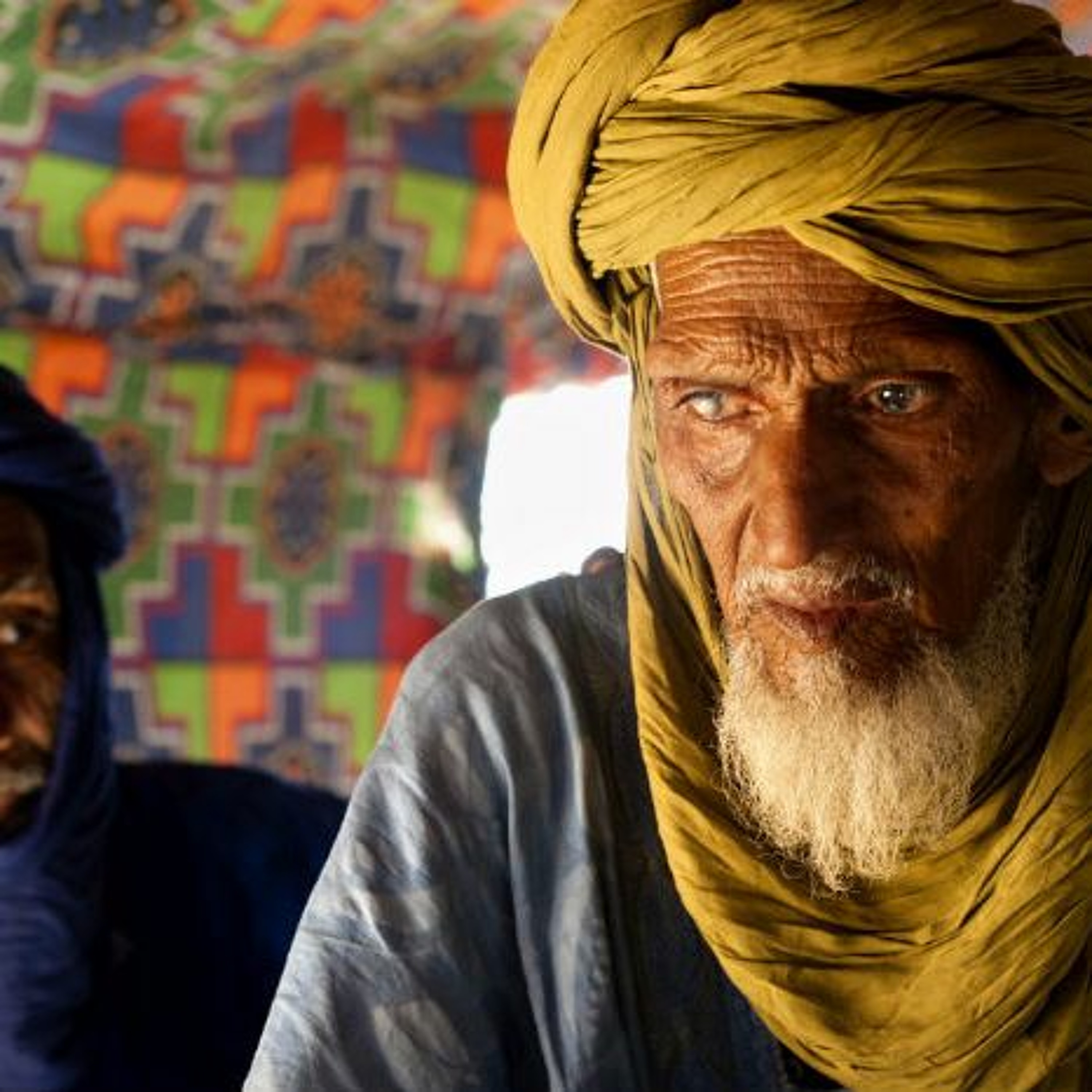
Santé, Science et DéveloppementSciDev.Net Podcast: End age discrimination in the SDGsIn today’s programme, we hear about the Sustainable Development Goals (SDGs) and why there’s been a call to tweak one target relating to SDG 3, which seeks to ensure healthy lives and promote well-being for all at all ages.
The target calls for a one-third cut in premature mortality from non-communicable diseases by 2030. Although the basic idea is laudable, some researchers say the target discriminates against people older than 70.
We then follow the footsteps of a researcher who has spent the last 15 years in Africa studying long-term, low-cost famine responses. He has found a way to bring seemingly dead tree...
2016-03-0131 min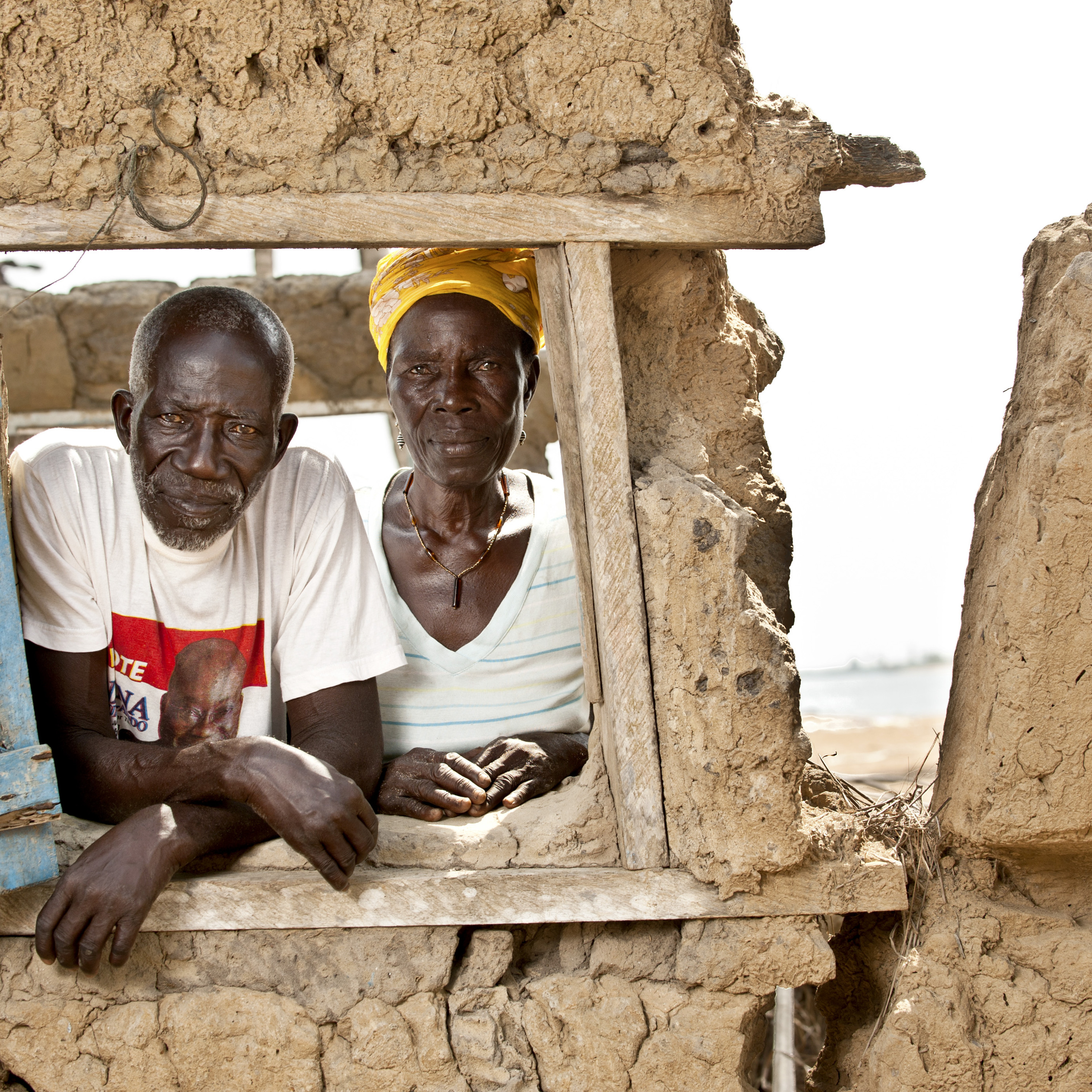
Santé, Science et DéveloppementSciDev.Net Podcast: Hurdles the climate deal must clearLast month saw one of the biggest breakthroughs in the history of climate response. UN member countries gathered in France to discuss and approve a global deal for emission reductions. The agreement is poised to give a critical push towards reducing the impacts of global warming in the coming decades and beyond.
As 2016 starts, we cast a critical eye over the agreement and reflect on the challenges to its implementation, ranging from technological hurdles to food security.
From international frameworks to work on the ground, we discover how measuring weather is important to inform climate science and better understand regional...
2015-12-2333 min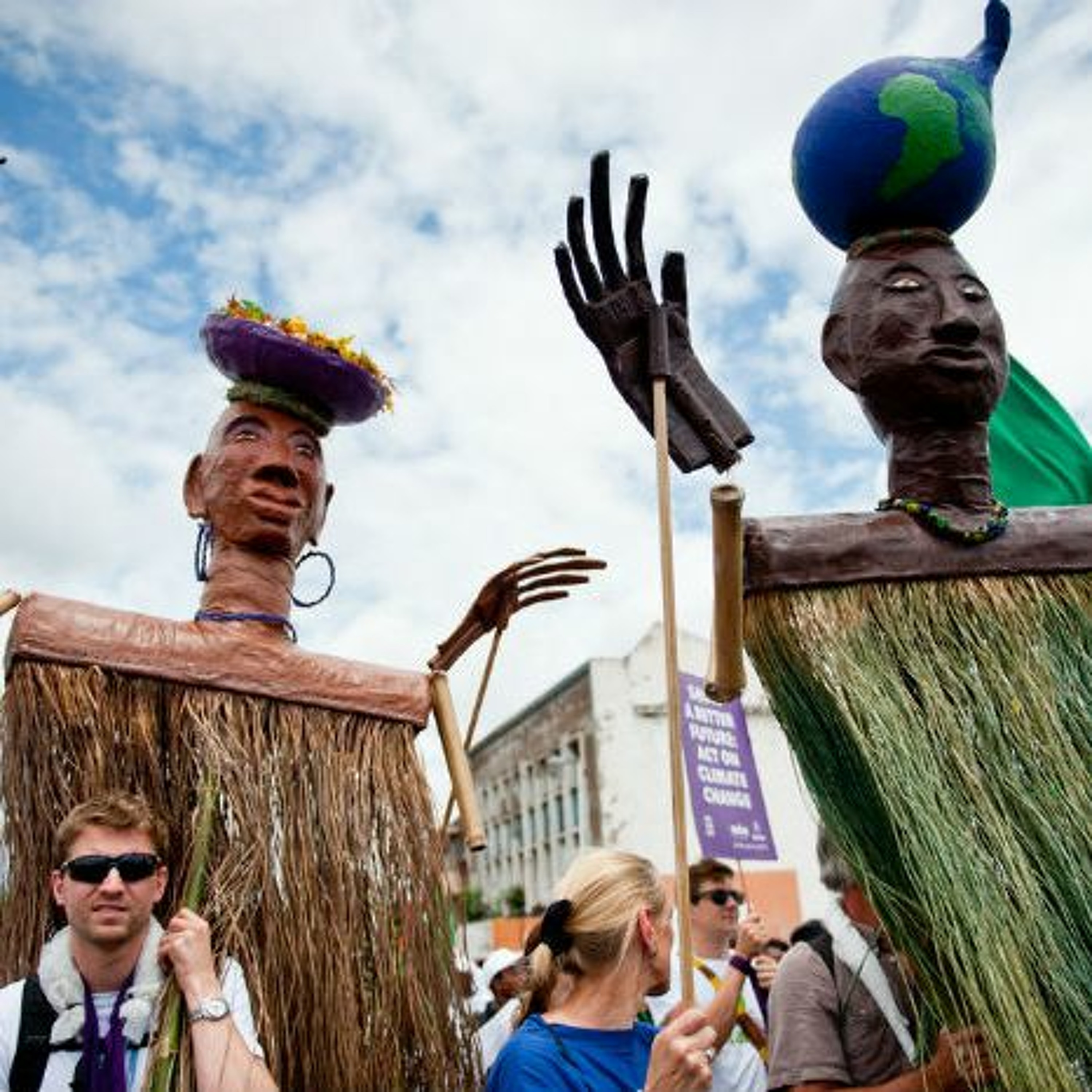
Santé, Science et DéveloppementSciDev.Net Podcast: Peaceful nuclear technologiesAs the UN climate talks kick off in Paris this week, we travel to South Africa to look at the real impacts of global warming on people.
We discover how worsening heatwaves already pose a serious threat to public health in Africa, that under climate change is likely to get on average two times hotter than the rest of the world.
We then learn about the less known applications of nuclear technologies, and why some believe that peaceful nuclear is the solution to humanity’s future problems, while others remain sceptical.
In the face of future challenges, it becomes increasingly im...
2015-12-0128 min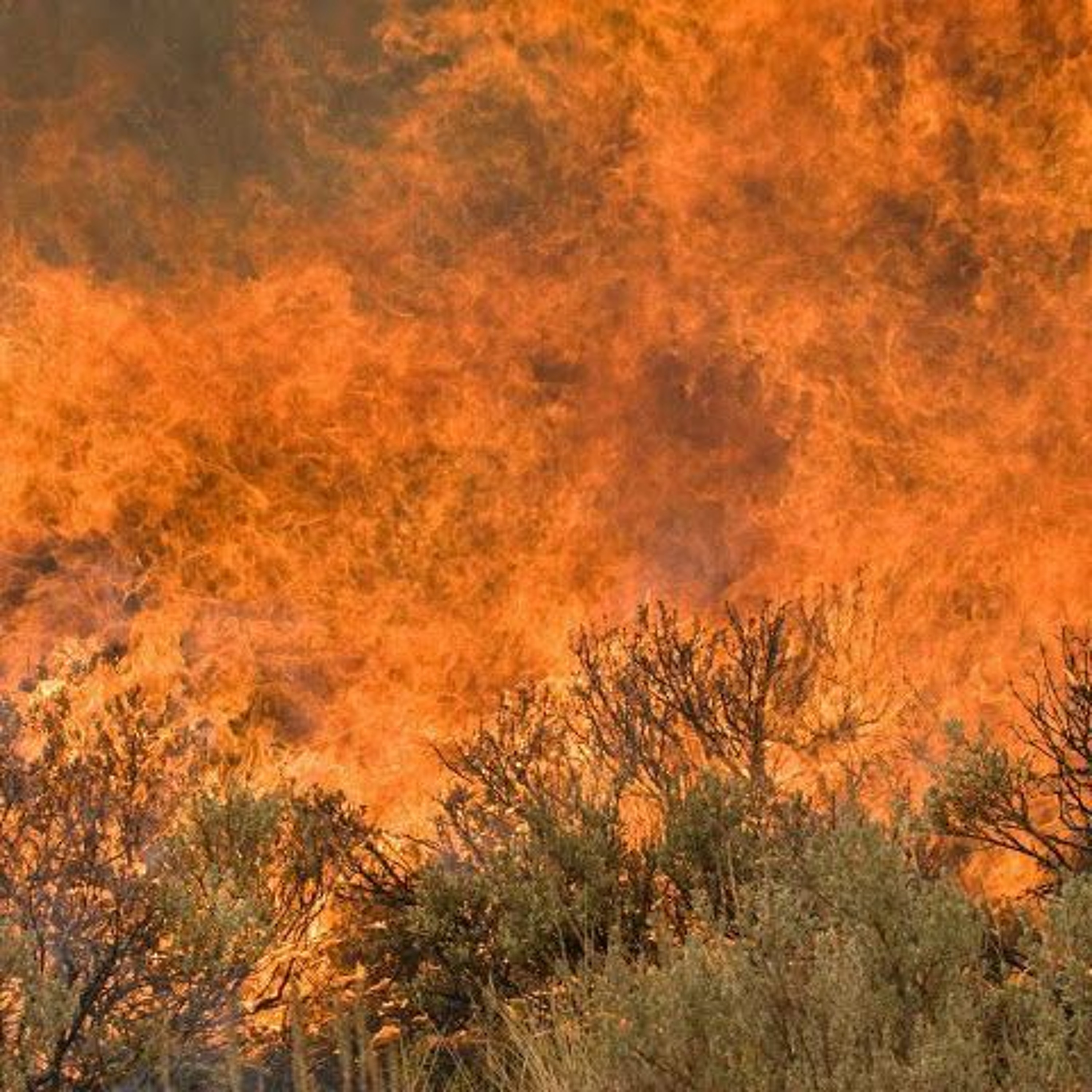
Santé, Science et DéveloppementSciDev.Net Podcast: Online wildfire fighters and moreOf the 16 million people worldwide who are injection drug users, 3 million are HIV positive and 10 million have Hepatitis C. In this month’s podcast we first look at an effective approach to reducing harm from drug abuse. Earlier this year, the city of Vancouver in Canada hosted a global conference on HIV to discuss options for treatment and infection prevention. Vancouver is one of the first cities in North America to trial a new approach to drug harm reduction. The strategy — of providing heroin addicts with a safe space and sterile needles to inject — reduces the likelihood of people contracting viruse...
2015-09-3033 min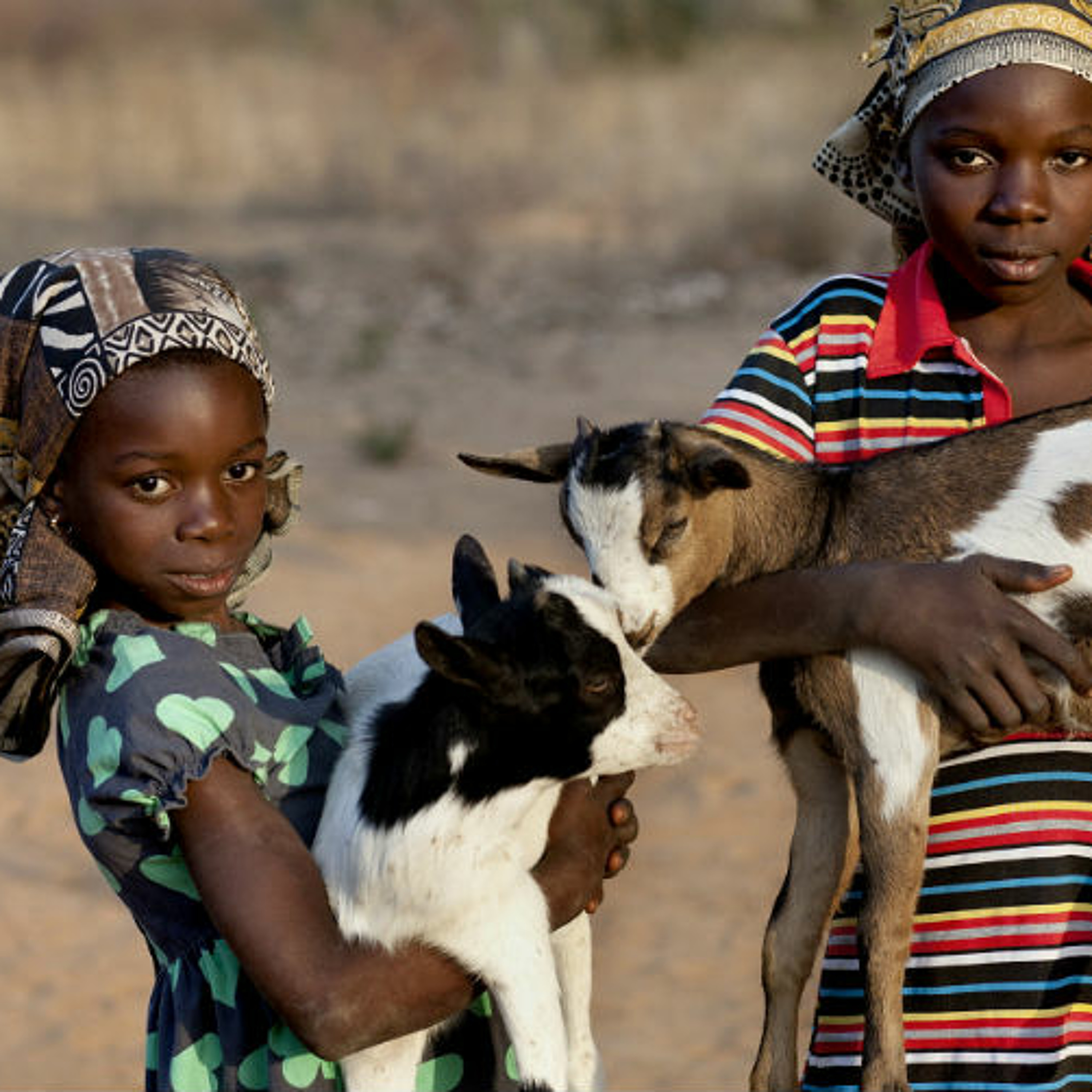
Santé, Science et DéveloppementSciDev.Net podcast: African farmers mitigate emissionsLivestock farming is the largest land use system on Earth. It uses 30 per cent of the world’s ice-free surface and sustains about 1.3 billion people.
But livestock is also responsible for 14.5 per cent of greenhouse gas emissions caused by humans, of which cattle produce 65 per cent. Better cattle management is vital to improve productivity while reducing emissions.
In Kenya, researchers are working with smallholder farmers to determine the impact of this form of land use and improve cattle and crop management. We discover how better practices can reduce farmers’ carbon footprint.
Next in the podcast, we hear an update on eart...
2015-07-3134 min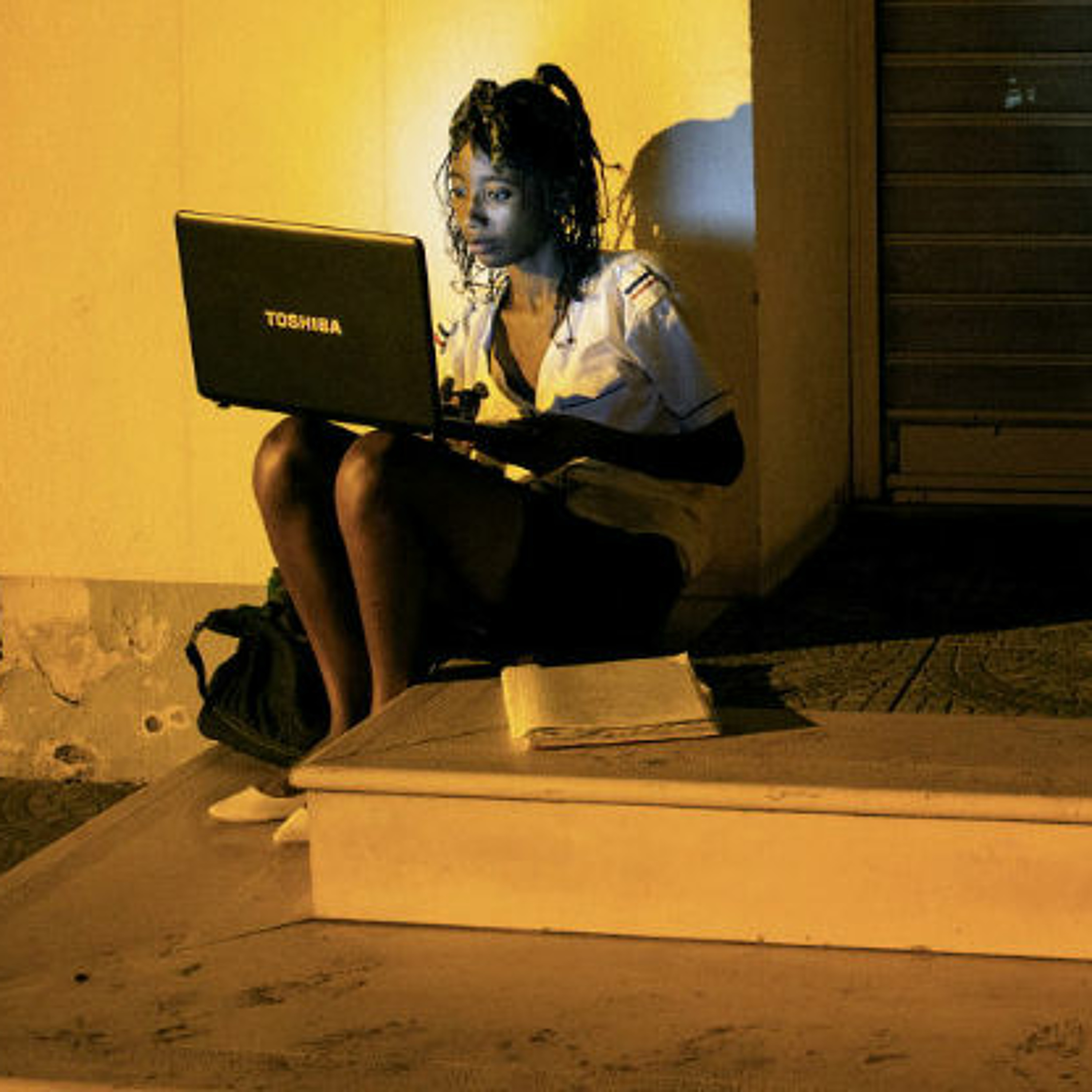
Santé, Science et DéveloppementSciDev.Net podcast: Universal internet access and moreIn this month’s podcast, we follow up on June’s reflection around internet access by reviewing a new device, called BRCK, that can bring connectivity to rural areas where electricity is scarce. Albeit remaining unaffordable to many, BRCK could be a step towards the ultimate goal of enabling everyone, everywhere to connect to the net.
We hear about how, after more than three decades of rapid growth, China is entering a new phase of development, in which it aims to promote economic growth while also slowing the rise in its greenhouse gas emissions. We discuss the new model of sust...
2015-07-0130 min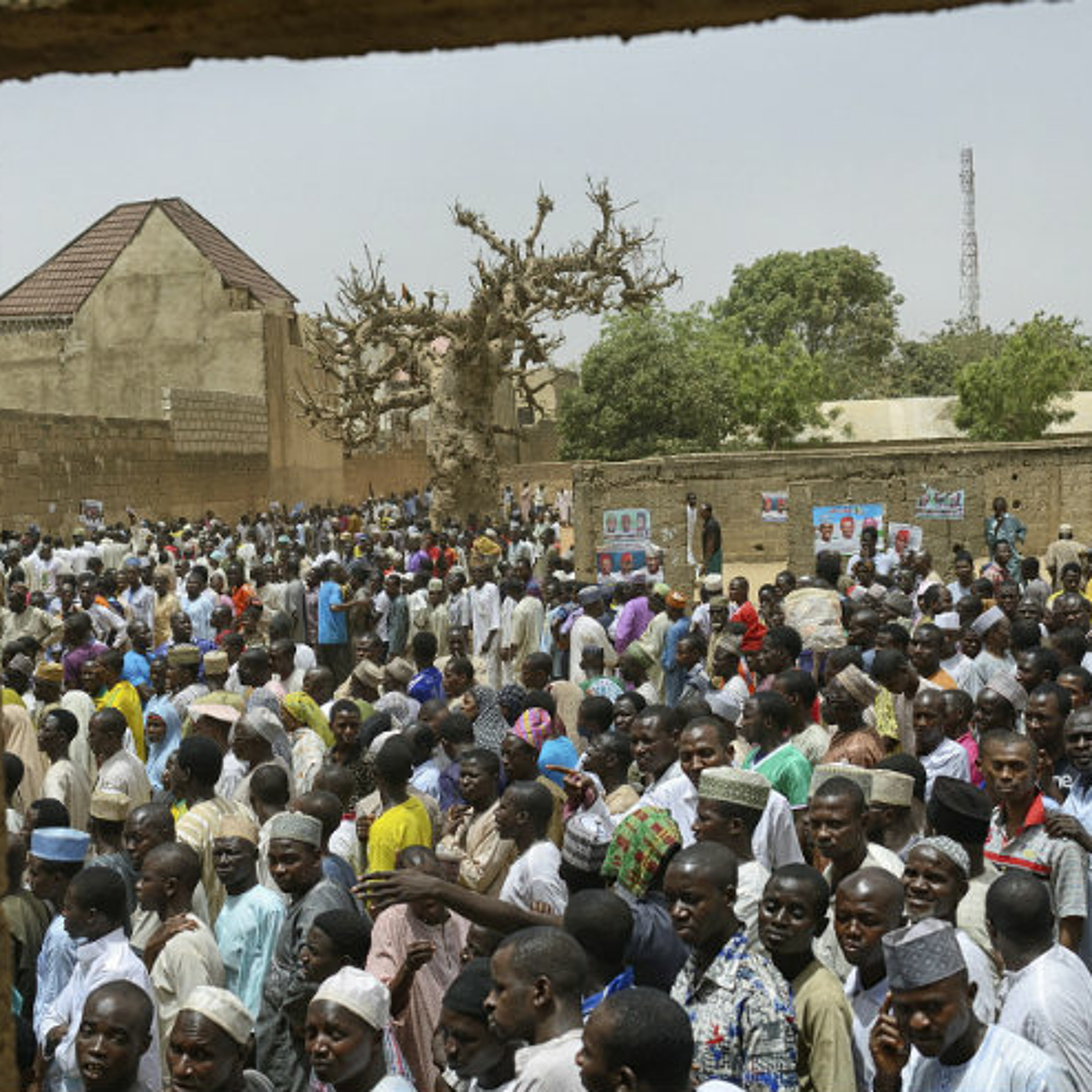
Santé, Science et DéveloppementSciDev.Net Podcast: Who are the missing millions?They are the world’s most vulnerable people. Often living in informal settlements and speaking only local languages, they are difficult to count and conventional surveys don’t capture their opinions, needs or even their presence.
A recent report by the Overseas Development Institute, in the United Kingdom, looks at the issue and tries to explain why the poorest are often left out of the official statistics that inform policymaking. Reporter Kevin Pollock speaks to one of the report’s authors to learn more.
If millions are missing from the global count, too many are also left offline, without access to the...
2015-06-0132 minSanté, Science et DéveloppementSciDev.Net Podcast: Mapping Nepal post-quake and moreThe powerful earthquake that struck Nepal on 25 April could be just the first of a series of quakes to hit the region in coming weeks.
Future tremors could add to the current death toll of more than 4,800 people and make it harder for aid agencies to deliver help where it’s needed. While NGOs are saving lives on the ground, freeing people trapped under the rubble and building emergency shelters, we learn how a team of mappers in the United Kingdom teamed up with the organisation Kathmandu Living Labs to build a real-time map of the affected areas. Their work co...
2015-05-0134 min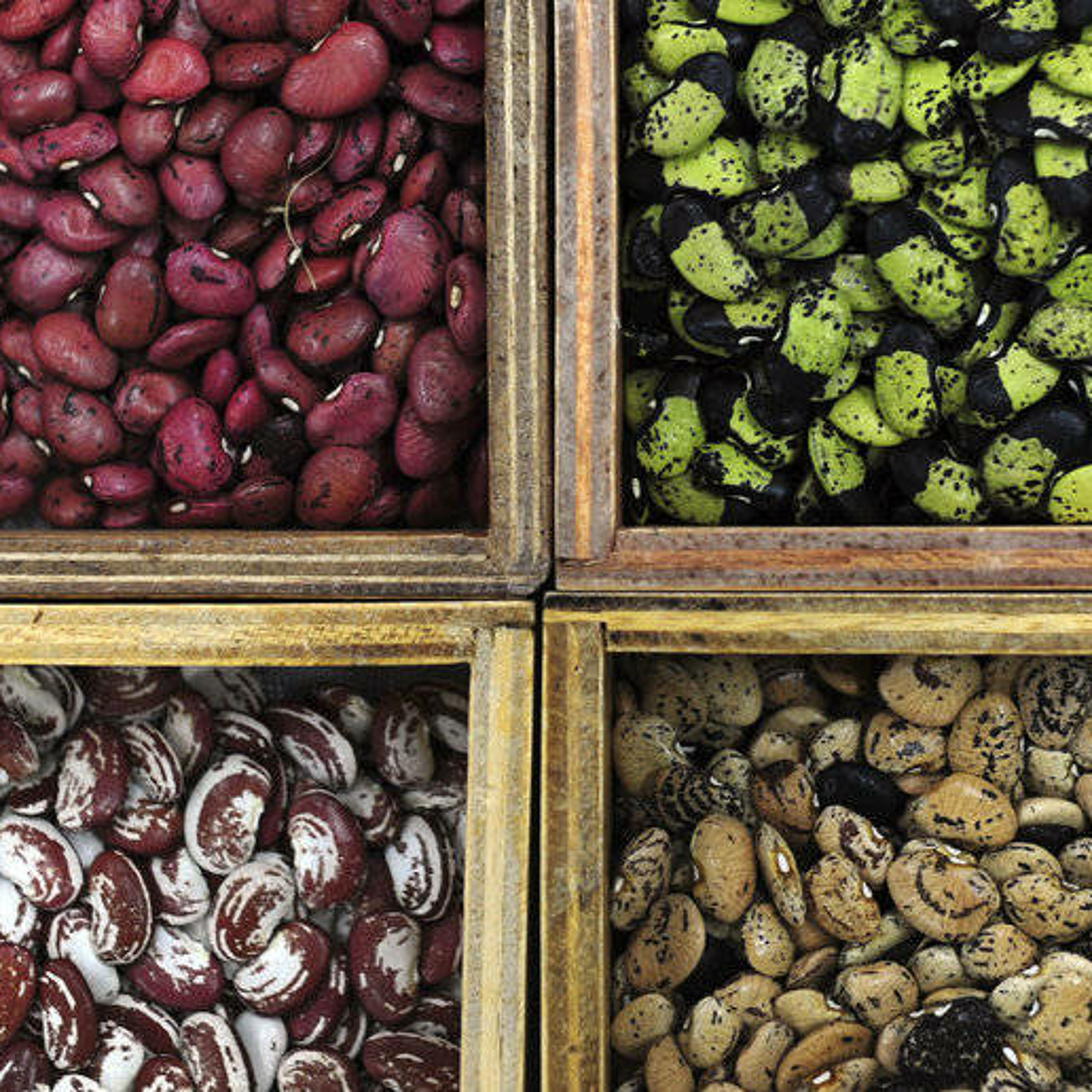
Santé, Science et DéveloppementSciDev.Net Podcast: Super beans, climate models and moreIn this month’s programme, we imagine a hotter world through the eyes of scientists and policymakers.
We kick off our podcast with ‘super beans’: 30 new varieties that can thrive in weather extremes. The beans were developed by scientists at CGIAR, a global research partnership for food security, to protect the ‘meat of the poor’ from being wiped out in a warmed world.
We then visit Oxford University in the United Kingdom where we hear from climate scientists running a global climate model on tens of thousands of volunteers’ home computers. With this experiment, they are investigating how global warming is increasin...
2015-04-0133 min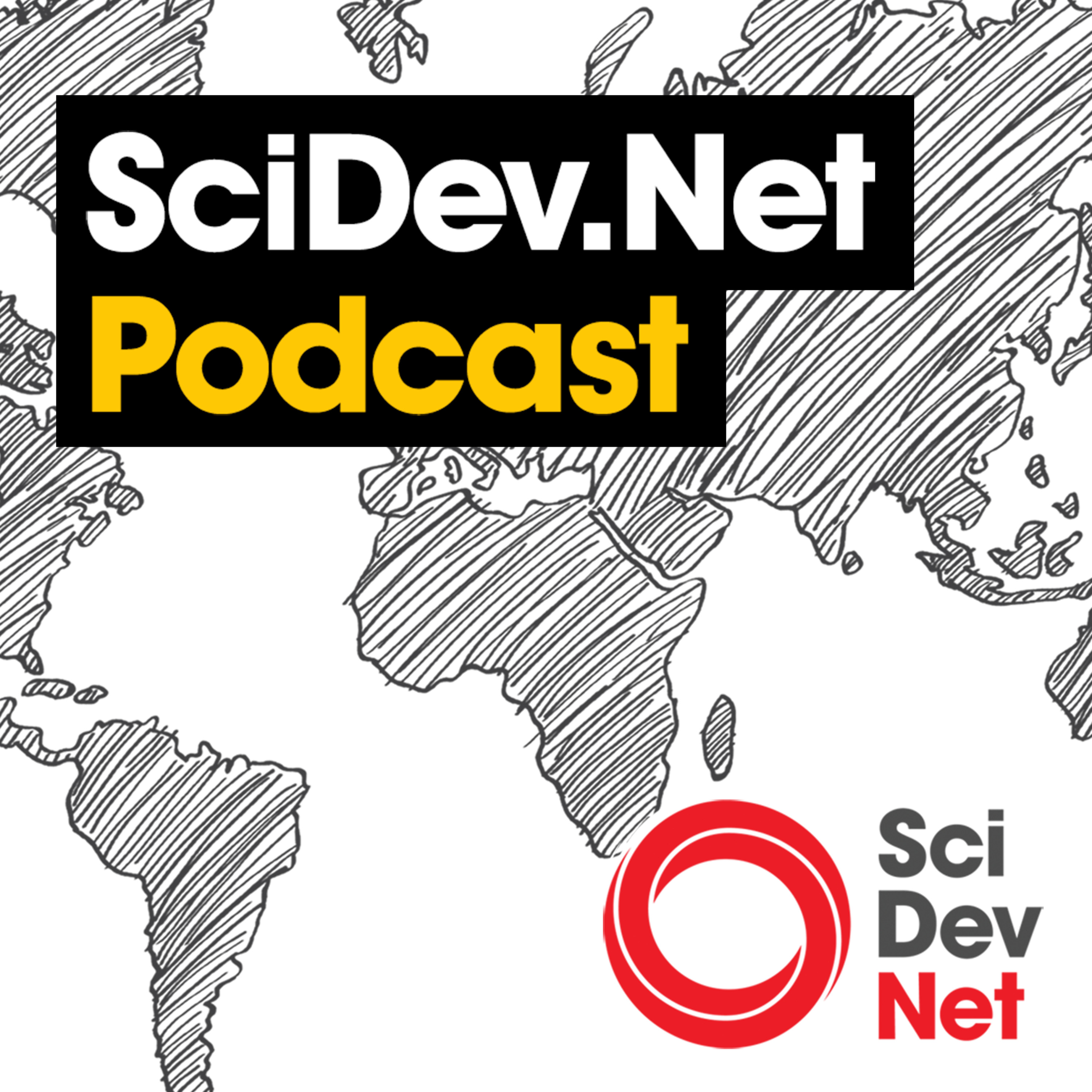
Santé, Science et DéveloppementSciDev.Net Podcast: What’s on the radar for 2015In this month’s programme, we examine what’s on the radar for science and development in 2015.
First, we take stock of the global response to the escalating danger of climate change, with a report from the UN’s latest climate summit in Lima, Peru. We reflect on the outcome of the conference, on what ongoing efforts will be taking place over coming months and on the major milestone for climate negotiations: the next UN climate summit in Paris, France, at the end of the year.
To mark the start of the UN year of light and light-based technologies, we open o...
2014-12-1929 min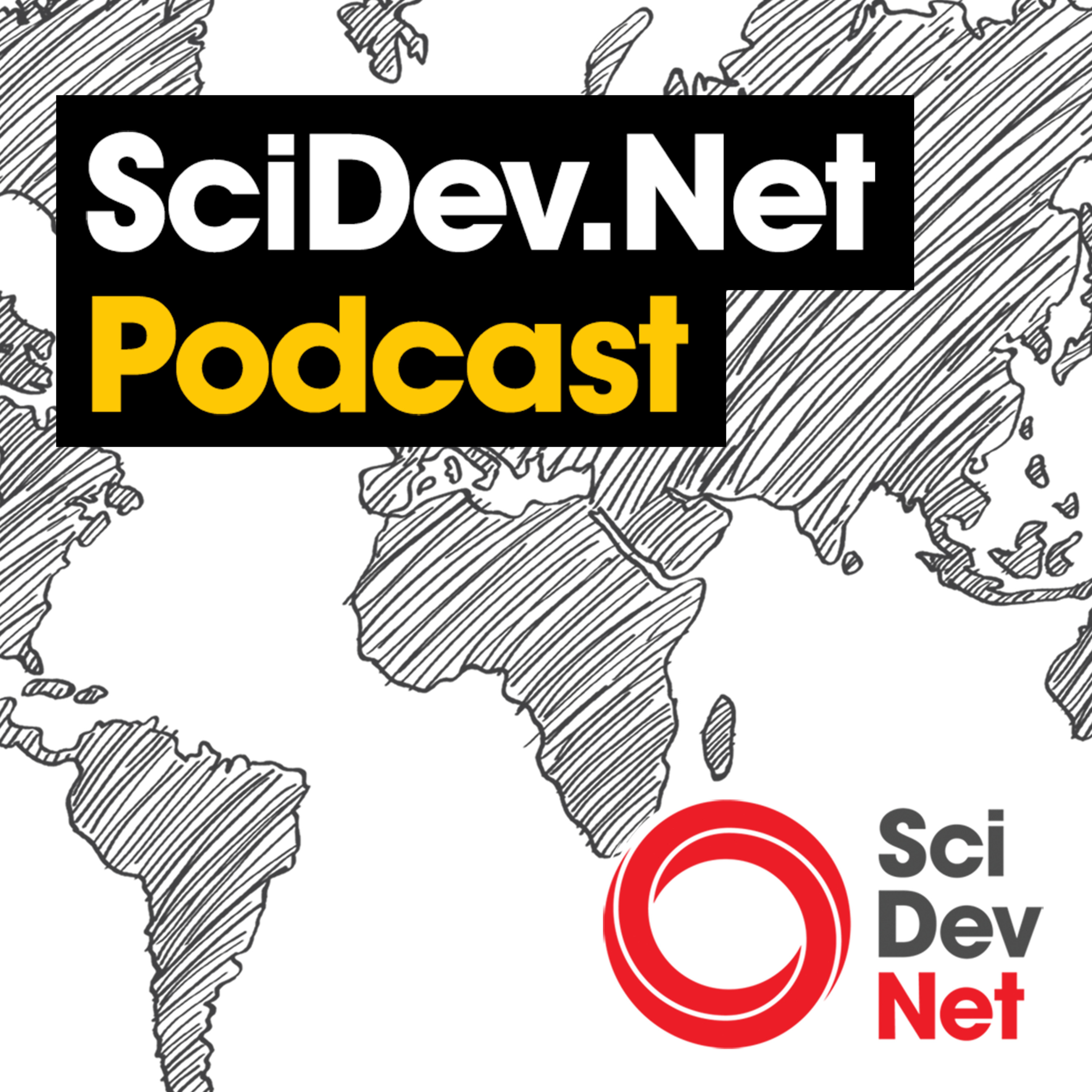
Santé, Science et DéveloppementSciDev.Net Podcast: Open mapping for developmentIn this month’s programme, we discover how technology is turning mapping into a powerful tool for supporting development and tackling humanitarian crises.
First, at the launch of the Missing Maps Project in London, United Kingdom, we join volunteers as they help to map two vulnerable areas in the Central African Republic and South Sudan, using satellite imagery to create basic maps to which local volunteers will add place names.
Then we speak to Anna Mason from MapAction, a charity that provides mapping services after disasters, to learn more about the satellite technology underlying open mapping work.
In Congo, we di...
2014-12-0132 min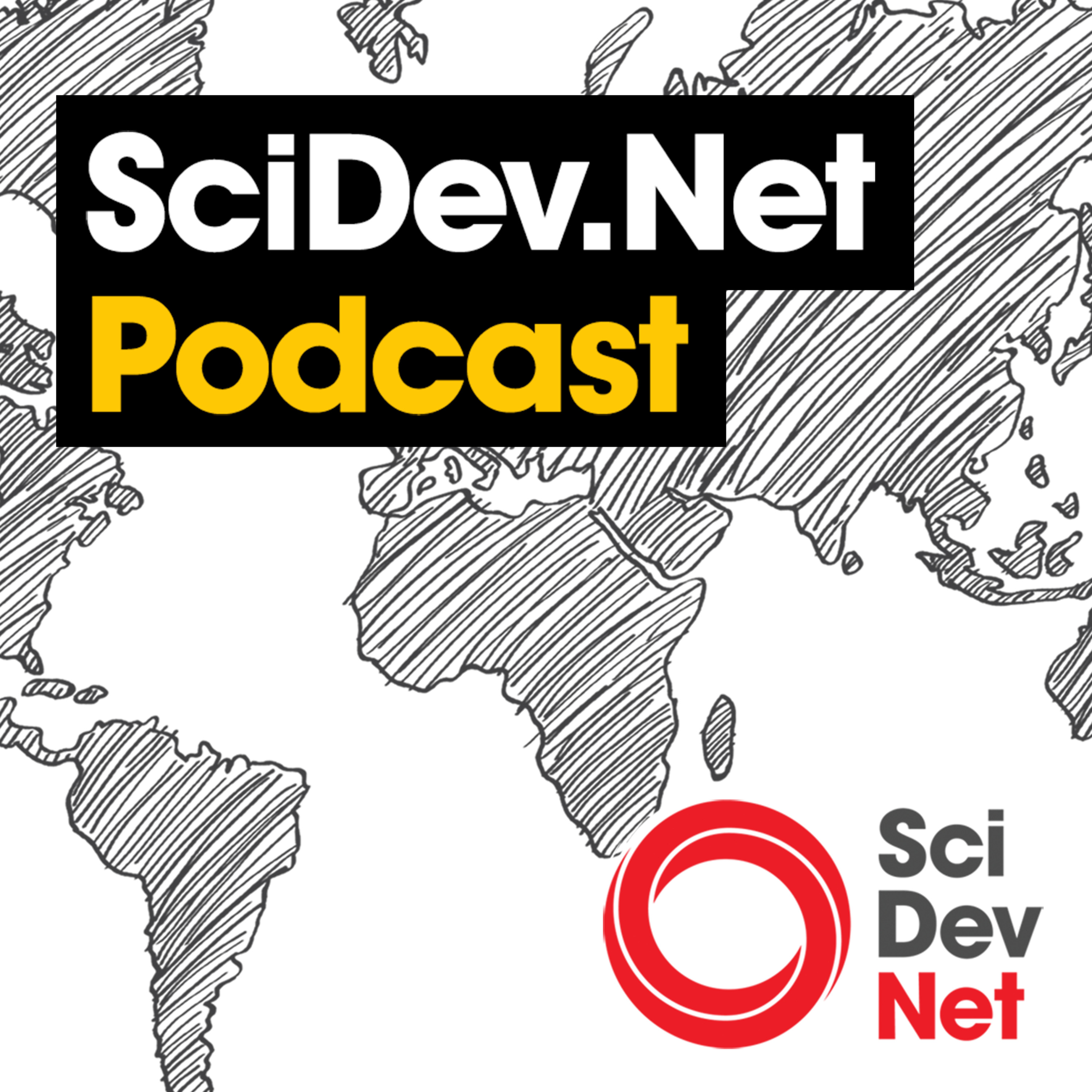
Santé, Science et DéveloppementSciDev.Net Podcast: ‘Flying donkey’ drones, biobanks and moreIn this month’s programme, we examine how the Ebola emergency has led to new forms of humanitarian response. One is the use of music to educate people about safety practices using simple language. We interviewed Carlos Chirinos, a visiting professor at New York University, United States, where he specialises in radio and development. He says that local West African communities tend to trust musicians more than doctors as sources of information, making them powerful allies when spreading public health messages.
We learn how biobanks, which store biological samples, are helping Africa foster local research capacity and what challenges the co...
2014-10-3033 min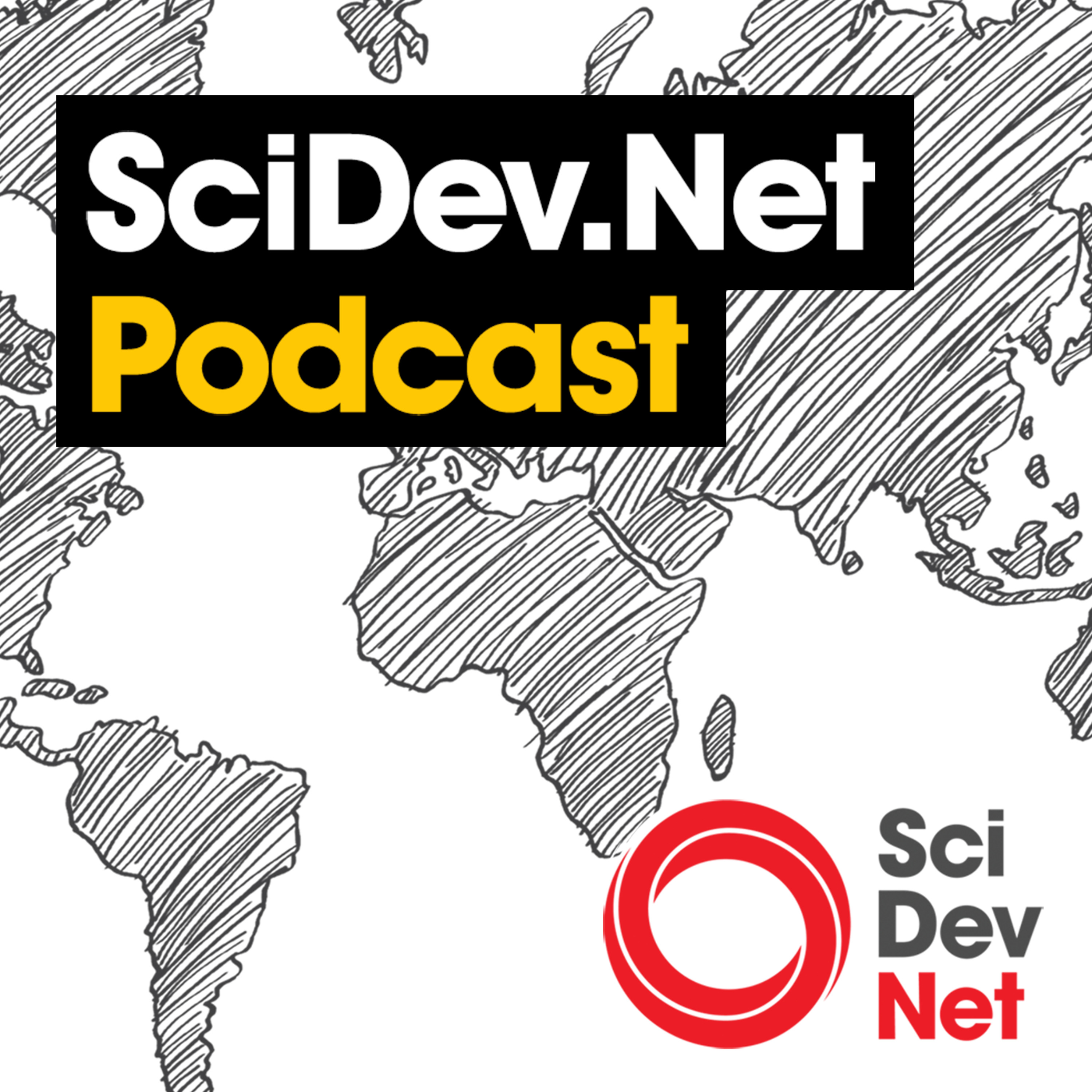
Santé, Science et DéveloppementSciDev.Net podcast: The vanishing small island statesIn this month’s show, we visit the island state of Kiribati, in the middle of the Pacific Ocean, whose future is at risk from rising sea levels brought about by climate change.
Scientists agree there are limited adaptation options for the tiniest archipelagos of the small island developing states (SIDS), a group of diverse tropical islands facing similar economic and environmental issues. Within 30 to 50 years, it is likely that Kiribati, along with other small states such as the Marshall Islands and Tuvalu, will disappear beneath the ocean.
In SciDev.Net’s UK studio, we hosted Victoria Burns, whose film, Tina...
2014-10-0131 min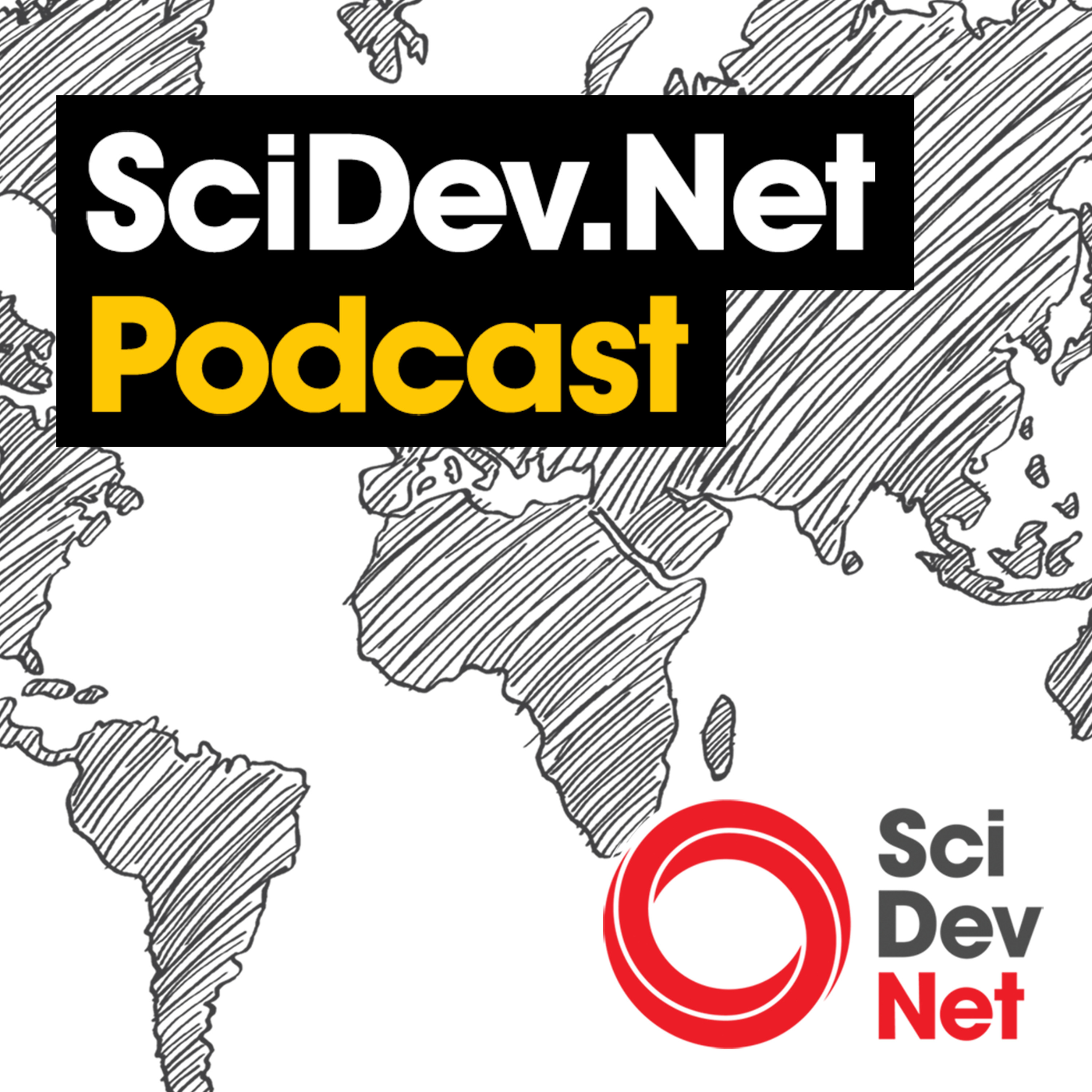
Santé, Science et DéveloppementSciDev.Net podcast: Ebola research, Maasai entrepreneurs and moreThis month’s podcast sheds light on the role of medical research in the current Ebola crisis. We learn about the main experimental treatment available and what the scientific institutions in the United Kingdom are doing to enable a fast and effective response to the outbreak.
We then travel to Maputo, capital of Mozambique, to discover how African universities are joining up their efforts to foster a new generation of agricultural scientists — in the belief that a dynamic scientific community can better prepare society for future environmental and economic challenges.
Looking at the current agenda for tomorrow’s global development we sit...
2014-09-0133 min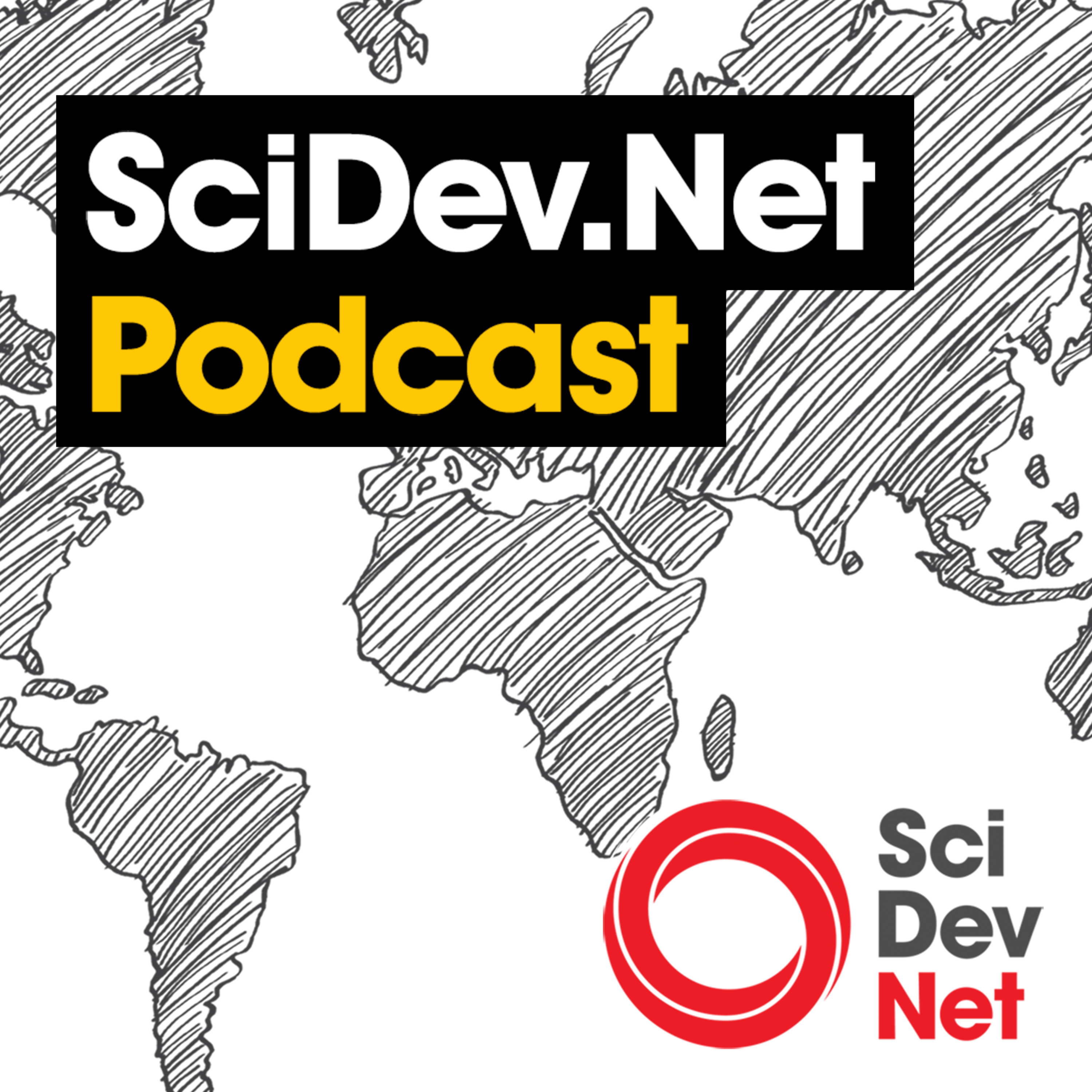
Santé, Science et DéveloppementSciDev.Net Podcast: A promising dengue vaccine and moreIn June's podcast, we also hear about e-learning platforms and balancing conservation and development in Costa Rica.
http://www.scidev.net/global/disease/multimedia/june-podcast-dengue-vaccine.html
2014-06-2434 min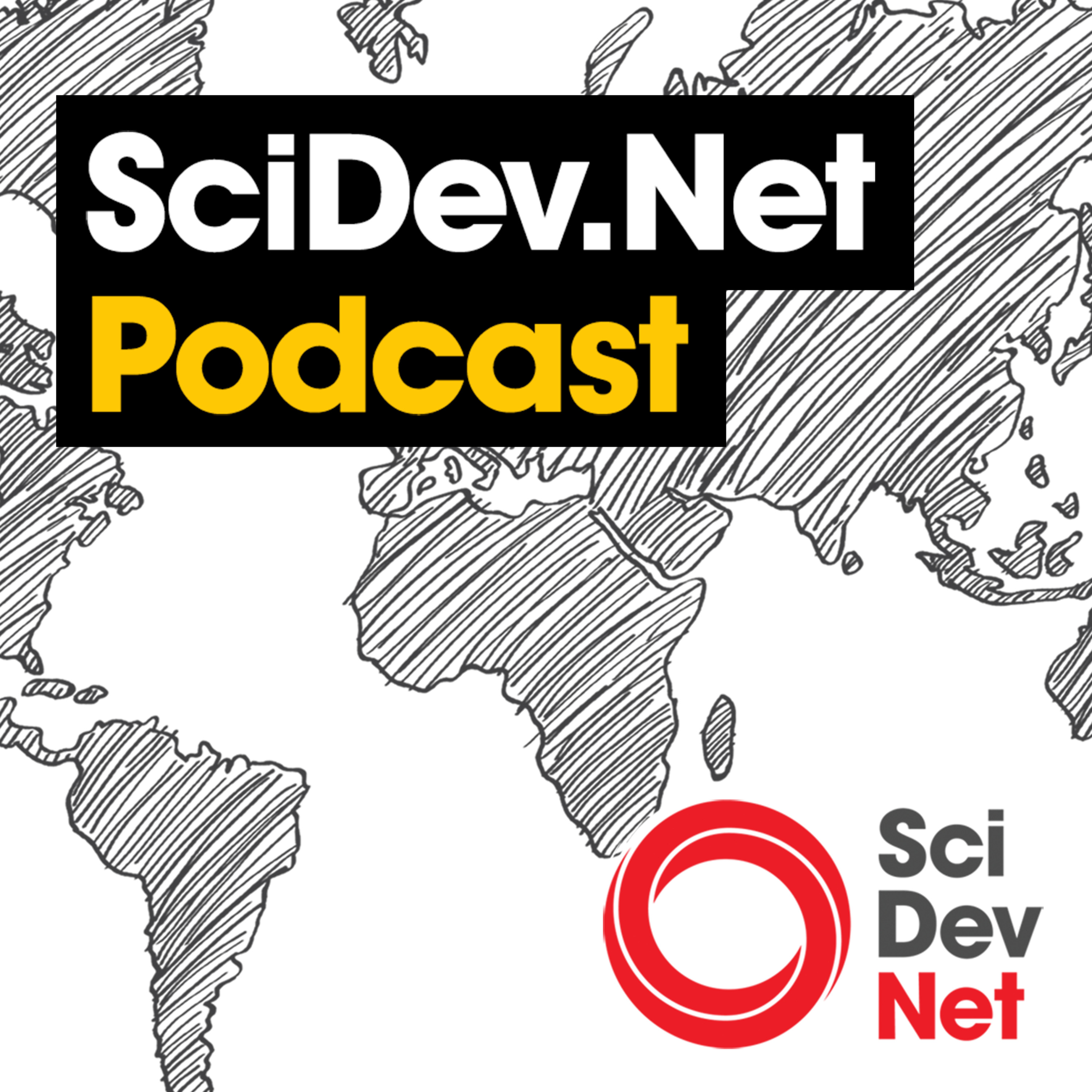
Santé, Science et DéveloppementSciDev.Net Podcast: Climate change adaptation and moreThis edition explores sustainable architecture, the financial risks of farming and Cuba’s scientific diaspora.
http://www.scidev.net/global/environment/multimedia/scidev-net-podcast-climate-change-adaptation-and-more.html
2014-05-0628 min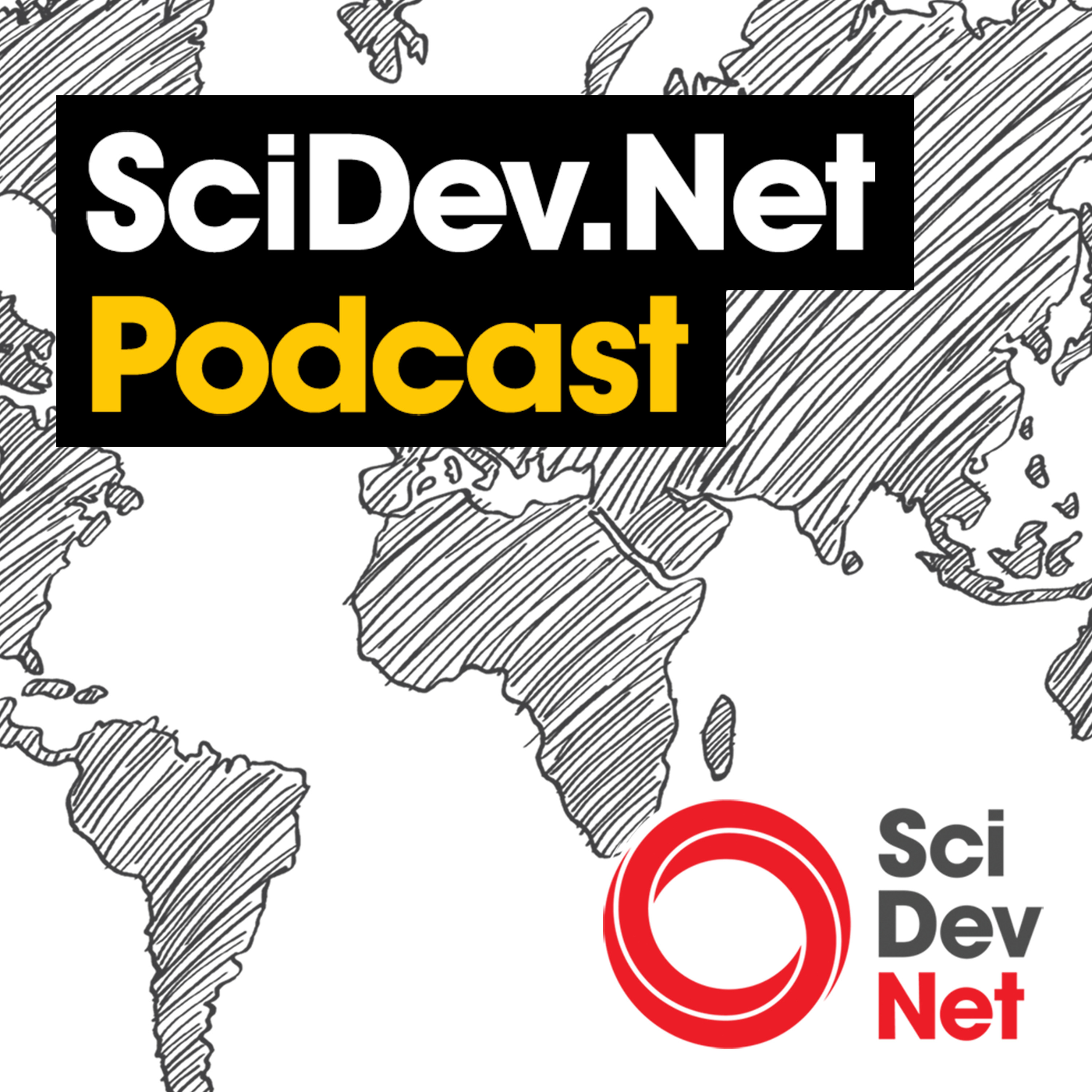
Santé, Science et DéveloppementGlobal SciDev.Net Podcast: Geojournalism, the world’s largest radio telescope and more!This broadcast also explores Africa’s knowledge economy and how biomedical researchers establish informed consent.
http://www.scidev.net/global/education/multimedia/scidev-net-podcast-geojournalism-the-world-s-largest-radio-telescope-and-more.html
2014-03-3139 min